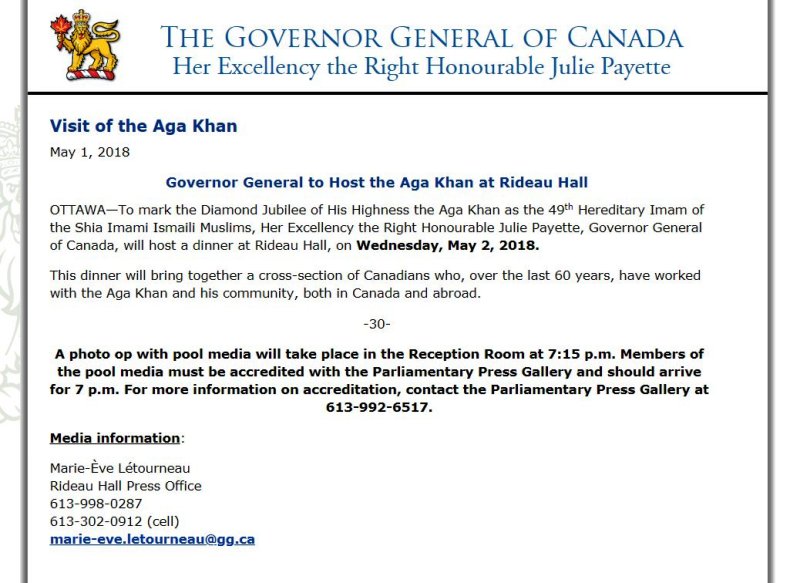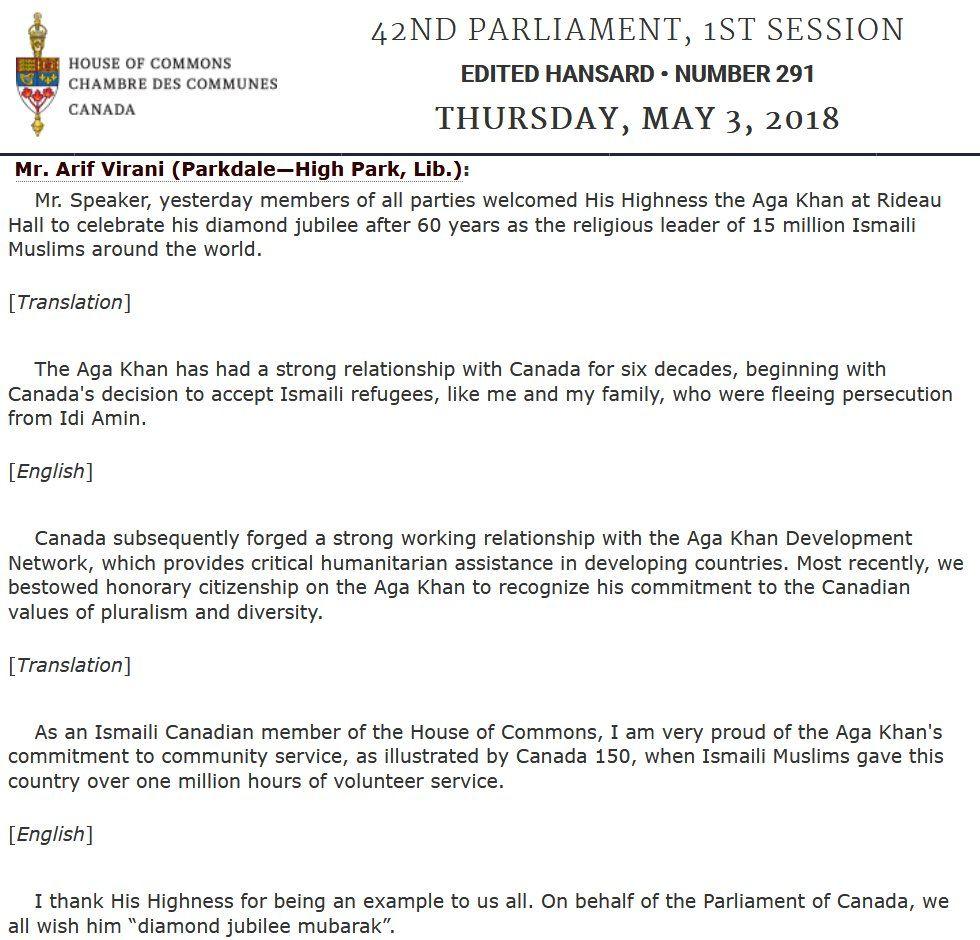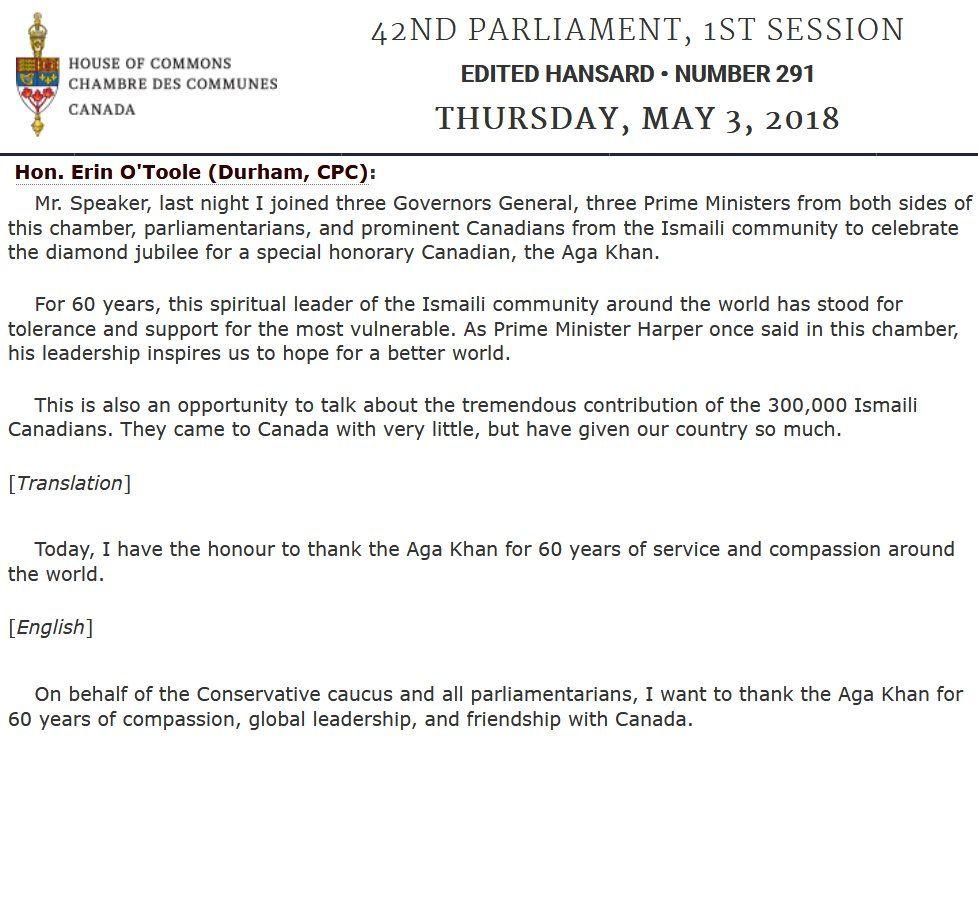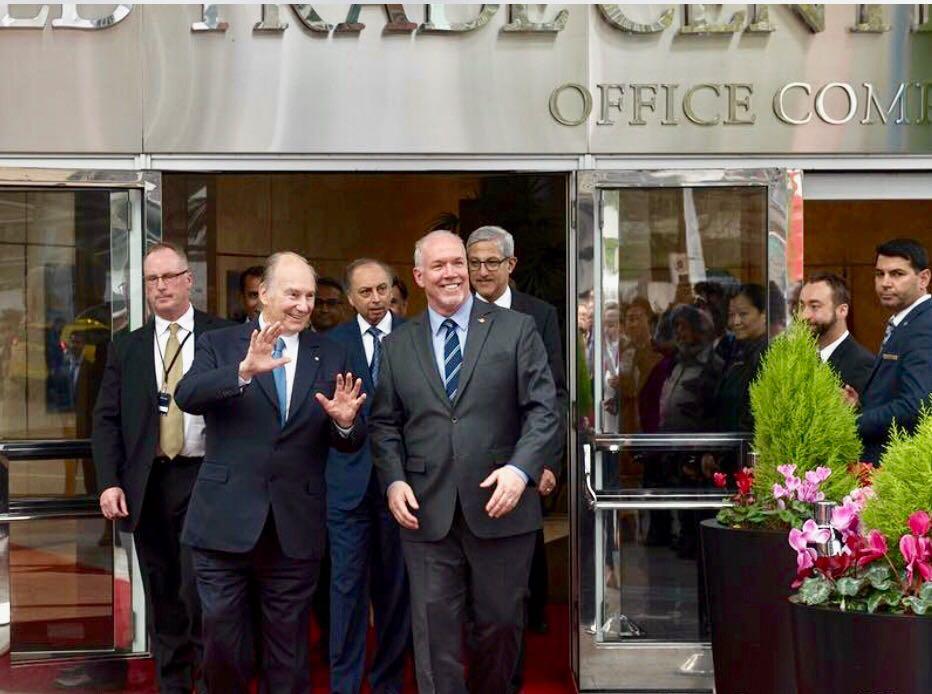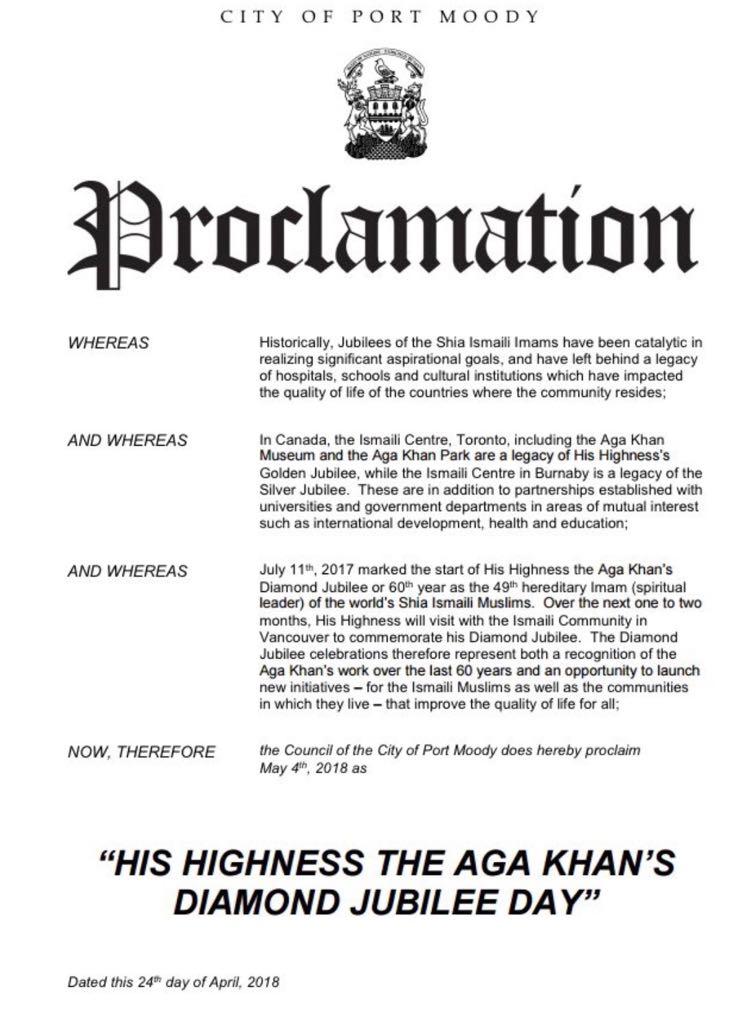Diamond-jubilee in the News
http://www.rcinet.ca/en/2018/05/01/pm-t ... in-ottawa/
PM Trudeau to attend dinner for Aga Khan in Ottawa
By Levon Sevunts | [email protected]
Tuesday 1 May, 2018 , No Comments ↓
Share
The Aga Khan, the billionaire spiritual leader of the world’s 15 million Shia Ismaili Muslims, is in Ottawa this week to celebrate his Diamond Jubilee and will be feted at a dinner at Rideau Hall hosted by Gov. Gen. Julie Payette on Wednesday.
The Aga Khan, who in 2010 became the fifth person to be named an honorary citizen of Canada, is also expected to meet with Prime Minister Justin Trudeau at the Governor General’s residence, the Prime Minister’s Office confirmed to Radio Canada International.
That’s expected to be the only meeting between the two leaders during the four-day visit to Canada by Prince Shah Karim Al Hussaini Aga Khan IV, an official at the PMO said.
Trudeau’s ties to the Aga Khan came under close public scrutiny in the House of Commons and the media last year after it emerged that Trudeau spent a week-long New Year’s vacation at a private island in the Bahamas owned by the well-connected philanthropist.
In addition to Trudeau and his family, other guests at Bell Island included Liberal MP Seamus O’Regan and his husband Stelios (Steve) Doussis as well as party president Anna Gainey and her husband Tom Pitfield.
Former U.S. Secretary of State John Kerry was also guest of the Aga Khan on the island and Trudeau said they discussed the then-incoming Trump administration.
The Aga Khan is the founder and chairman of the Aga Khan Development Network that has received millions of dollars from the Canadian government for international development work.
In December 2017, federal Conflict of Interest and Ethics Commissioner Mary Dawson found that Trudeau broke the federal ethics act by accepting the trip.
Dawson also reprimanded Trudeau for accepting a ride to the island on the Aga Khan’s helicopter, and not recusing himself from discussions that could place him in a conflict of interest, as the Aga Khan’s foundation was registered to lobby Trudeau at the time.
Trudeau apologized, saying he considered the Aga Khan a close family friend.
Canada is home to over 80,000 of Ismaili Muslims that came to Canada in the 1970s to escape Ugandan dictator Idi Amin’s rule. There are now over 60,000 Ismaili Muslims in Canada.
Following the reception in Ottawa, the Aga Khan will then continue his visit to Canada, travelling to other parts of the country, including Vancouver and Calgary, Global Affairs Canada said.
PM Trudeau to attend dinner for Aga Khan in Ottawa
By Levon Sevunts | [email protected]
Tuesday 1 May, 2018 , No Comments ↓
Share
The Aga Khan, the billionaire spiritual leader of the world’s 15 million Shia Ismaili Muslims, is in Ottawa this week to celebrate his Diamond Jubilee and will be feted at a dinner at Rideau Hall hosted by Gov. Gen. Julie Payette on Wednesday.
The Aga Khan, who in 2010 became the fifth person to be named an honorary citizen of Canada, is also expected to meet with Prime Minister Justin Trudeau at the Governor General’s residence, the Prime Minister’s Office confirmed to Radio Canada International.
That’s expected to be the only meeting between the two leaders during the four-day visit to Canada by Prince Shah Karim Al Hussaini Aga Khan IV, an official at the PMO said.
Trudeau’s ties to the Aga Khan came under close public scrutiny in the House of Commons and the media last year after it emerged that Trudeau spent a week-long New Year’s vacation at a private island in the Bahamas owned by the well-connected philanthropist.
In addition to Trudeau and his family, other guests at Bell Island included Liberal MP Seamus O’Regan and his husband Stelios (Steve) Doussis as well as party president Anna Gainey and her husband Tom Pitfield.
Former U.S. Secretary of State John Kerry was also guest of the Aga Khan on the island and Trudeau said they discussed the then-incoming Trump administration.
The Aga Khan is the founder and chairman of the Aga Khan Development Network that has received millions of dollars from the Canadian government for international development work.
In December 2017, federal Conflict of Interest and Ethics Commissioner Mary Dawson found that Trudeau broke the federal ethics act by accepting the trip.
Dawson also reprimanded Trudeau for accepting a ride to the island on the Aga Khan’s helicopter, and not recusing himself from discussions that could place him in a conflict of interest, as the Aga Khan’s foundation was registered to lobby Trudeau at the time.
Trudeau apologized, saying he considered the Aga Khan a close family friend.
Canada is home to over 80,000 of Ismaili Muslims that came to Canada in the 1970s to escape Ugandan dictator Idi Amin’s rule. There are now over 60,000 Ismaili Muslims in Canada.
Following the reception in Ottawa, the Aga Khan will then continue his visit to Canada, travelling to other parts of the country, including Vancouver and Calgary, Global Affairs Canada said.
Last edited by Admin on Fri May 04, 2018 10:48 pm, edited 1 time in total.
2018, May 1st, H.H. The Aga Khan arrived in Ottawa, Canada this afternoon and was welcomed by institutional members from Eastern Canada. Leaving the airport, he waved at the Jamat standing outside. He is expected to leave on 4th May a.m. Prime Minister Justin Trudeau will attend the Governor General's Dinner in honour of the Diamond Jubilee of H.H. The Aga Khan tomorrow Wednesday evening.
PHOTO: Mowlana Hazar Imam at Ottawa airport this afternoon.
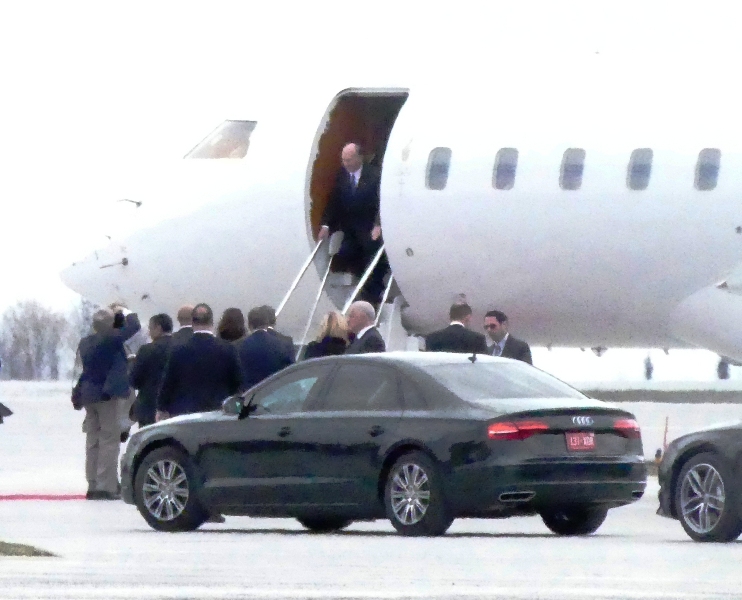
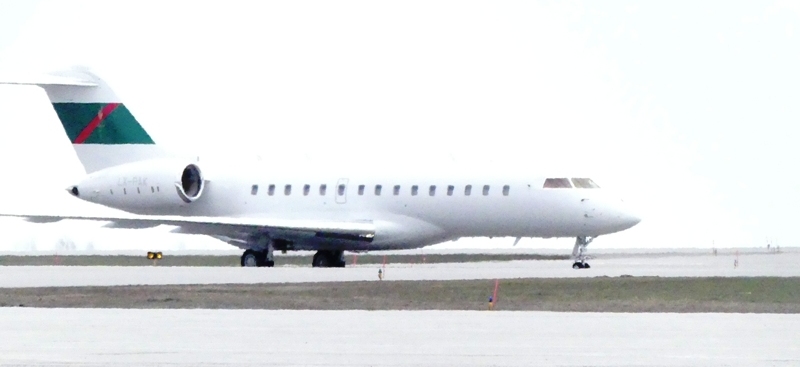
PHOTO: Mowlana Hazar Imam at Ottawa airport this afternoon.


Mawlana Hazar Imam returns to Canada for his Diamond Jubilee visit
Mawlana Hazar Imam arrived in Ottawa on 1 May, marking the first stop of his Diamond Jubilee visit to Canada.
He was received at the airport by Government of Canada representatives the Honourable Marie-Claude Bibeau, Minister of International Development and La Francophonie; Ambassador Marc-André Blanchard, Canada’s Permanent Representative to the United Nations; as well as Senator Mobina Jaffer and Members of Parliament Arif Virani and Yasmin Ratansi. Mawlana Hazar Imam was also received by President of the Ismaili Council for Canada Malik Talib and AKDN Resident Representative for Canada Dr Mahmoud Eboo, as well as Jamati and AKDN leadership.
This visit takes place at the invitation of the Government of Canada and will include an official dinner held at Rideau Hall, hosted by Her Excellency the Right Honourable Julie Payette, the Governor General of Canada, as well as meetings at the Global Centre for Pluralism.
“The Diamond Jubilee provides an opportunity for people everywhere, here in Canada and elsewhere, to re-dedicate themselves to the ethics and values that underpin our partnerships with communities around the world to help improve quality of life. It is an opportunity to give back and look forward,” said Dr Eboo.
Remarking on the importance of this visit, Malik Talib added that the visit was “an opportunity to celebrate the deep and lasting relationships Mawlana Hazar Imam has built with Canadian institutions over his 60 years of service and to recognise the contributions of Canadian Ismailis from coast to coast.”
Following his time in Ottawa, Mawlana Hazar Imam will travel to Vancouver and Calgary, where he will meet with the Jamats of British Columbia, Edmonton, and the Prairies.
Mawlana Hazar Imam’s visit to Western Canada is a continuation of his previous visit to Eastern Canada in November 2017. The Jamats across Canada joyously celebrate the arrival of Mawlana Hazar Imam and are preparing with great excitement for the Mulaqats to come.
https://the.ismaili/diamond-jubilee/maw ... ilee-visit
Mawlana Hazar Imam arrived in Ottawa on 1 May, marking the first stop of his Diamond Jubilee visit to Canada.
He was received at the airport by Government of Canada representatives the Honourable Marie-Claude Bibeau, Minister of International Development and La Francophonie; Ambassador Marc-André Blanchard, Canada’s Permanent Representative to the United Nations; as well as Senator Mobina Jaffer and Members of Parliament Arif Virani and Yasmin Ratansi. Mawlana Hazar Imam was also received by President of the Ismaili Council for Canada Malik Talib and AKDN Resident Representative for Canada Dr Mahmoud Eboo, as well as Jamati and AKDN leadership.
This visit takes place at the invitation of the Government of Canada and will include an official dinner held at Rideau Hall, hosted by Her Excellency the Right Honourable Julie Payette, the Governor General of Canada, as well as meetings at the Global Centre for Pluralism.
“The Diamond Jubilee provides an opportunity for people everywhere, here in Canada and elsewhere, to re-dedicate themselves to the ethics and values that underpin our partnerships with communities around the world to help improve quality of life. It is an opportunity to give back and look forward,” said Dr Eboo.
Remarking on the importance of this visit, Malik Talib added that the visit was “an opportunity to celebrate the deep and lasting relationships Mawlana Hazar Imam has built with Canadian institutions over his 60 years of service and to recognise the contributions of Canadian Ismailis from coast to coast.”
Following his time in Ottawa, Mawlana Hazar Imam will travel to Vancouver and Calgary, where he will meet with the Jamats of British Columbia, Edmonton, and the Prairies.
Mawlana Hazar Imam’s visit to Western Canada is a continuation of his previous visit to Eastern Canada in November 2017. The Jamats across Canada joyously celebrate the arrival of Mawlana Hazar Imam and are preparing with great excitement for the Mulaqats to come.
https://the.ismaili/diamond-jubilee/maw ... ilee-visit
http://www.asianpacificpost.com/article ... -khan.html
Canada, Asia and The Aga Khan
published by asingh on Tue, 05/01/2018 - 18:52
By M.J. Roberts
Mata Press Service
The Aga Khan’s visit to Vancouver this weekend is expected to attract over 100,000 people for an Ismaili-Canadian celebration of shared values, inclusiveness and pluralism.
Part of his worldwide Diamond Jubilee tour, the Aga Khan’s visit to Canada includes stops in Ottawa, Vancouver (May 5-to-7) and Calgary (May 9-to-11).
Earlier this week in Ottawa, the Aga Khan attended a dinner at Rideau Hall, the official residence of the Governor General.
In Vancouver and Calgary, he will meet with an active faith community that reveres the Aga Khan as a living, hereditary spiritual leader – or Imam – directly descended from the Prophet Muhammad.
For Canadian Ismailis, the tour represents an opportunity to reflect on the tenets of a faith steeped in strong principles of volunteerism and support for humanitarian causes.
It is also an opportunity to connect with the global philanthropist whose Aga Khan Development Network (AKDN) has transformed the quality of life for millions of people around the world. Canada has been a strong supporter of that work, particularly in the developing countries of Asia where the AKDN has invested more than half-a-billion dollars of Canadian money over the past four decades.
Rahim Talib, a lawyer and entrepreneur, is a volunteer with the Vancouver-based Ismaili Muslim Committee, which is co-organizing the West Coast leg of the Aga Khan’s Diamond Jubilee tour. Talib says it is customary in Jubilee years for the Aga Khan to visit and meet with the faith community, which is based in 30 countries around the world.
“Any time his Highness is in our city, it’s very special, but the Aga Khan’s Diamond Jubilee makes his visit even more special,” says Talib. “The community is incredibly excited about it.”
Canada and the Ismaili Imamat or congregation, have a long history of co-operation and mutual respect, both in Canada and abroad.
The Aga Khan is the spiritual leader of 15 million people around the world, including 120,000 in Canada, who belong to the Ismaili faith. They’re a global, multi-ethnic community whose members — comprising a wide diversity of cultures, languages and nationalities — live in Central Asia, the Middle East, South Asia, sub-Saharan Africa, Europe and North America.
In British Columbia there are about 20,000 Ismailis, whose names dominate industry, real estate development, capital markets and local charities.
The Aga Khan has a long-standing relationship with Canada, dating back to the arrival of the first Ismailis in the 1950s and 1960s as part of a professional pool that immigrated to Canada from the United Kingdom and western European countries.
This steady growth continued until the early 1970s when political changes in many Asian and African countries led to the arrival of large numbers of Ismailis in Canada. Today, approximately 120,000 Ismailis of diverse origins are settled throughout Canada.
In Canada, institutions established by the Aga Khan Foundation Canada, an agency of the worldwide, non-denominational Aga Khan Development Network (AKDN) include the Global Centre for Pluralism (in partnership with the Government of Canada); the Ismaili Centre in Burnaby; the Aga Khan Museum, the Ismaili Centre, and Park in Toronto; the Aga Khan Garden, Alberta; and a forthcoming park in Burnaby.
“If you look at the close relationship between Canada and the Imamat over the last several decades, it reflects the shared values of pluralism, diversity, tolerance, openness, and a mutual commitment to combating poverty and instability in some of the toughest parts of the world,” says Talib.
“I think his Highness loves Canada. And I think he shares in this conviction that we believe in as a community, that the world needs more Canada.”
It is these Ismaili-held principles of peace, pluralism, and ethics-in-action that so clearly align with Canada’s own development policies, particularly as they relate to Asia, where the challenges of health, education, gender equality, and economic empowerment still impact vast populations in the region.
Canada is the largest external supporter of the AKDN’s work in Asia, with grants totalling over C$500 million since 1981 and an active portfolio valued at $C140 million.
Steve Mason is the Director of Programs with the Aga Khan Foundation of Canada, and responsible for oversight and management of the organization’s overseas portfolio in Africa and Asia.
Mason says the major areas of focus in Asia are India, Pakistan, Bangladesh, and Pakistan in South Asia, and Tajikistan and Kazakhstan in Central Asia.
The development agency, adds Mason, takes a “multi-pronged approached” aimed at improving quality of life, particularly for poor and marginalized populations, with a specific emphasis on women and girls. The AKDN has also partnered with like-minded organizations in the region, including the Asia Development Bank headquartered in the Philippines and the Japan International Cooperation Agency based in Tokyo.
“A lot of the work that we’ve done in Asia over the years has been supported very significantly by Canada and by Canadians,” says Mason, adding that some of the more “transformational” work has been undertaken in South Asia, where large swaths of the population were extremely impoverished and isolated when the AKDN arrived in the early 1980s.
“Canada was an early investor in the Aga Khan rural support programs in India and Pakistan, which really had a very significant focus on moving people out of just subsistence agriculture into livelihoods that could actually generate an income,” says Mason.
“Canadian investment has also been essential in health and education, in training nurses, midwives and teachers.”
Mason says the Aga Khan’s Diamond Jubilee year is an excellent opportunity to reflect upon the work that has been done, and on the road ahead. New challenges in Asia include mitigating the impacts of climate change on peoples’ livelihoods, keeping pace with shifting demographics including the health and education needs of much younger populations, and continuing to promote the pluralist ethic of the Aga Khan and his globe-spanning faith community.
“In some ways we’ve seen increased interconnectedness around the world but in other ways there has also been retrenchment into us-versus-them mentalities,” says Mason.
“We always try and work in areas where we can help bridge ethnic, religious, or cultural divides and help people see their commonalities rather than their differences.”
The Aga Khan’s global reach by the numbers
49/60 - His Highness the Aga Khan, a direct descendant of the Prophet Muhammad, commenced his Diamond Jubilee, or 60th year as the 49th hereditary Imam (spiritual leader) of the world’s Shia Ismaili Muslims on July 11, 2017.
15,000,000 - The Aga Khan is the spiritual leader of 15 million people around the world, including 120,000 in Canada, who belong to the Ismaili faith. They’re a global, multi-ethnic community whose members — comprising a wide diversity of cultures, languages and nationalities — live in Central Asia, the Middle East, South Asia, sub-Saharan Africa, Europe and North America.
80,000 - The Aga Khan Development Network (AKDN) works in over 30 countries around the world. It employs approximately 80,000 people, the majority of whom are based in developing countries. The AKDN’s annual budget for non-profit development activities is approximately US$ 925 million. The project companies of the Aga Khan Fund for Economic Development (AKFED) generated revenues of US$ 4.1 billion (all surpluses are reinvested in further development activities).
2,000,000 - The Aga Khan University (AKU) hospitals network in Pakistan, East Africa and Afghanistan, treat more than 2 million patients annually and have provided reduced-cost treatment to 2.4 million low-income patients over the last 30 years. In Pakistan alone University health network includes the 710-bed Aga Khan University Hospital in Karachi and 264 outreach medical centers in more than 100 cities across the country.
8,000,000 - Over 8 million people benefit from the activities of the Aga Khan Rural Support Programs, which range from small infrastructure projects such as irrigation canals and roads to projects to boost yields of rice and wheat. For instance, in Gujarat, India, where water is highly contaminated, the Aga Khan Foundation has built 10,000 roof rainwater harvesting structures to help 40,000 women access potable drinking water. In Sofia, Madagascar, a rice farming program now provides livelihoods for 40,000 farmers and their families.
9,000 - Over 9,000 building projects ranging from rural schools to urban water towers, from state-of-the-art skyscrapers to modest mud-brick structures. This is part of the AKDN impact on architecture and human habitats around the globe.
17,000,000 – The AKDN offers a range of financial services from community-based savings groups to corporate banking to life insurance. These services are used by 17 million people each year. In addition, the Aga Khan Agency for Microfinance provides loans to over 300,000 clients for housing, health and education, making a direct impact on the lives of these families as they meet their day-to-day needs.
$100,000,000 - In 1985, a group of women in Vancouver came together to persuade 1,000 other Canadians to join them in a walk to fight global poverty and raised $55,000. That first walk has now grown into an annual event, and is held in 10 cities across Canada with the support of tens of thousands of volunteers, corporate sponsors and participants. 33 years later, the World Partnership Walk has raised more than $100 million - making it the largest event in Canada in support of international development.
What they say:
“The Aga Khan’s decades of work in fighting poverty, encouraging peace, and promoting education and religious understanding offer a much needed witness to common belief in loving God and our neighbour. His philanthropy, rooted in his Muslim faith, demonstrates to the world that religious convictions have a vital role to play in secular society.” — Most Rev. J. Michael Miller, CSB Archbishop of Vancouver.
“We, from the bottom of our hearts, congratulate you and hope that you continue to have a positive impact not only on the lives in Canada, but on the lives of those, who are hungry, sick and in need of education to stand on their feet in the world.” — Suresh Kurl, is a retired senior public servant who writes on socio-political issues and Hinduism.
“The Aga Khan, is not only the spiritual leader of the Shia Imami Ismaili Muslims. He is a global statesman who promotes the principles of pluralism and inclusivity in the fields of economic development, job creation, education, health care, as well as heritage, music, and fine art.” — Anthony Shelton, Director, Museum of Anthropology at the University of British Columbia.
“The Aga Khan’s tireless advocacy to bridge the humanitarian-development divide has always been a guiding beacon for me; during my early years in Uganda, then as a refugee to Italy and the United States, and now as a businessman in British Columbia.” — Sam Hirji, president Samco Printers, Vancouver, BC.
“Like our Sikh Gurus, the Aga Khan transcends religious boundaries and has created a movement based on universal humanism. He is a radical force not confined to within the borders of any one faith. He is a committed community builder and a global ambassador of Canadian values who preaches the spirit of connection.” — Harbinder Singh Sewak, publisher of the Vancouver-based South Asian Post and recipient of the UK-based World Sikh Award.
Canada, Asia and The Aga Khan
published by asingh on Tue, 05/01/2018 - 18:52
By M.J. Roberts
Mata Press Service
The Aga Khan’s visit to Vancouver this weekend is expected to attract over 100,000 people for an Ismaili-Canadian celebration of shared values, inclusiveness and pluralism.
Part of his worldwide Diamond Jubilee tour, the Aga Khan’s visit to Canada includes stops in Ottawa, Vancouver (May 5-to-7) and Calgary (May 9-to-11).
Earlier this week in Ottawa, the Aga Khan attended a dinner at Rideau Hall, the official residence of the Governor General.
In Vancouver and Calgary, he will meet with an active faith community that reveres the Aga Khan as a living, hereditary spiritual leader – or Imam – directly descended from the Prophet Muhammad.
For Canadian Ismailis, the tour represents an opportunity to reflect on the tenets of a faith steeped in strong principles of volunteerism and support for humanitarian causes.
It is also an opportunity to connect with the global philanthropist whose Aga Khan Development Network (AKDN) has transformed the quality of life for millions of people around the world. Canada has been a strong supporter of that work, particularly in the developing countries of Asia where the AKDN has invested more than half-a-billion dollars of Canadian money over the past four decades.
Rahim Talib, a lawyer and entrepreneur, is a volunteer with the Vancouver-based Ismaili Muslim Committee, which is co-organizing the West Coast leg of the Aga Khan’s Diamond Jubilee tour. Talib says it is customary in Jubilee years for the Aga Khan to visit and meet with the faith community, which is based in 30 countries around the world.
“Any time his Highness is in our city, it’s very special, but the Aga Khan’s Diamond Jubilee makes his visit even more special,” says Talib. “The community is incredibly excited about it.”
Canada and the Ismaili Imamat or congregation, have a long history of co-operation and mutual respect, both in Canada and abroad.
The Aga Khan is the spiritual leader of 15 million people around the world, including 120,000 in Canada, who belong to the Ismaili faith. They’re a global, multi-ethnic community whose members — comprising a wide diversity of cultures, languages and nationalities — live in Central Asia, the Middle East, South Asia, sub-Saharan Africa, Europe and North America.
In British Columbia there are about 20,000 Ismailis, whose names dominate industry, real estate development, capital markets and local charities.
The Aga Khan has a long-standing relationship with Canada, dating back to the arrival of the first Ismailis in the 1950s and 1960s as part of a professional pool that immigrated to Canada from the United Kingdom and western European countries.
This steady growth continued until the early 1970s when political changes in many Asian and African countries led to the arrival of large numbers of Ismailis in Canada. Today, approximately 120,000 Ismailis of diverse origins are settled throughout Canada.
In Canada, institutions established by the Aga Khan Foundation Canada, an agency of the worldwide, non-denominational Aga Khan Development Network (AKDN) include the Global Centre for Pluralism (in partnership with the Government of Canada); the Ismaili Centre in Burnaby; the Aga Khan Museum, the Ismaili Centre, and Park in Toronto; the Aga Khan Garden, Alberta; and a forthcoming park in Burnaby.
“If you look at the close relationship between Canada and the Imamat over the last several decades, it reflects the shared values of pluralism, diversity, tolerance, openness, and a mutual commitment to combating poverty and instability in some of the toughest parts of the world,” says Talib.
“I think his Highness loves Canada. And I think he shares in this conviction that we believe in as a community, that the world needs more Canada.”
It is these Ismaili-held principles of peace, pluralism, and ethics-in-action that so clearly align with Canada’s own development policies, particularly as they relate to Asia, where the challenges of health, education, gender equality, and economic empowerment still impact vast populations in the region.
Canada is the largest external supporter of the AKDN’s work in Asia, with grants totalling over C$500 million since 1981 and an active portfolio valued at $C140 million.
Steve Mason is the Director of Programs with the Aga Khan Foundation of Canada, and responsible for oversight and management of the organization’s overseas portfolio in Africa and Asia.
Mason says the major areas of focus in Asia are India, Pakistan, Bangladesh, and Pakistan in South Asia, and Tajikistan and Kazakhstan in Central Asia.
The development agency, adds Mason, takes a “multi-pronged approached” aimed at improving quality of life, particularly for poor and marginalized populations, with a specific emphasis on women and girls. The AKDN has also partnered with like-minded organizations in the region, including the Asia Development Bank headquartered in the Philippines and the Japan International Cooperation Agency based in Tokyo.
“A lot of the work that we’ve done in Asia over the years has been supported very significantly by Canada and by Canadians,” says Mason, adding that some of the more “transformational” work has been undertaken in South Asia, where large swaths of the population were extremely impoverished and isolated when the AKDN arrived in the early 1980s.
“Canada was an early investor in the Aga Khan rural support programs in India and Pakistan, which really had a very significant focus on moving people out of just subsistence agriculture into livelihoods that could actually generate an income,” says Mason.
“Canadian investment has also been essential in health and education, in training nurses, midwives and teachers.”
Mason says the Aga Khan’s Diamond Jubilee year is an excellent opportunity to reflect upon the work that has been done, and on the road ahead. New challenges in Asia include mitigating the impacts of climate change on peoples’ livelihoods, keeping pace with shifting demographics including the health and education needs of much younger populations, and continuing to promote the pluralist ethic of the Aga Khan and his globe-spanning faith community.
“In some ways we’ve seen increased interconnectedness around the world but in other ways there has also been retrenchment into us-versus-them mentalities,” says Mason.
“We always try and work in areas where we can help bridge ethnic, religious, or cultural divides and help people see their commonalities rather than their differences.”
The Aga Khan’s global reach by the numbers
49/60 - His Highness the Aga Khan, a direct descendant of the Prophet Muhammad, commenced his Diamond Jubilee, or 60th year as the 49th hereditary Imam (spiritual leader) of the world’s Shia Ismaili Muslims on July 11, 2017.
15,000,000 - The Aga Khan is the spiritual leader of 15 million people around the world, including 120,000 in Canada, who belong to the Ismaili faith. They’re a global, multi-ethnic community whose members — comprising a wide diversity of cultures, languages and nationalities — live in Central Asia, the Middle East, South Asia, sub-Saharan Africa, Europe and North America.
80,000 - The Aga Khan Development Network (AKDN) works in over 30 countries around the world. It employs approximately 80,000 people, the majority of whom are based in developing countries. The AKDN’s annual budget for non-profit development activities is approximately US$ 925 million. The project companies of the Aga Khan Fund for Economic Development (AKFED) generated revenues of US$ 4.1 billion (all surpluses are reinvested in further development activities).
2,000,000 - The Aga Khan University (AKU) hospitals network in Pakistan, East Africa and Afghanistan, treat more than 2 million patients annually and have provided reduced-cost treatment to 2.4 million low-income patients over the last 30 years. In Pakistan alone University health network includes the 710-bed Aga Khan University Hospital in Karachi and 264 outreach medical centers in more than 100 cities across the country.
8,000,000 - Over 8 million people benefit from the activities of the Aga Khan Rural Support Programs, which range from small infrastructure projects such as irrigation canals and roads to projects to boost yields of rice and wheat. For instance, in Gujarat, India, where water is highly contaminated, the Aga Khan Foundation has built 10,000 roof rainwater harvesting structures to help 40,000 women access potable drinking water. In Sofia, Madagascar, a rice farming program now provides livelihoods for 40,000 farmers and their families.
9,000 - Over 9,000 building projects ranging from rural schools to urban water towers, from state-of-the-art skyscrapers to modest mud-brick structures. This is part of the AKDN impact on architecture and human habitats around the globe.
17,000,000 – The AKDN offers a range of financial services from community-based savings groups to corporate banking to life insurance. These services are used by 17 million people each year. In addition, the Aga Khan Agency for Microfinance provides loans to over 300,000 clients for housing, health and education, making a direct impact on the lives of these families as they meet their day-to-day needs.
$100,000,000 - In 1985, a group of women in Vancouver came together to persuade 1,000 other Canadians to join them in a walk to fight global poverty and raised $55,000. That first walk has now grown into an annual event, and is held in 10 cities across Canada with the support of tens of thousands of volunteers, corporate sponsors and participants. 33 years later, the World Partnership Walk has raised more than $100 million - making it the largest event in Canada in support of international development.
What they say:
“The Aga Khan’s decades of work in fighting poverty, encouraging peace, and promoting education and religious understanding offer a much needed witness to common belief in loving God and our neighbour. His philanthropy, rooted in his Muslim faith, demonstrates to the world that religious convictions have a vital role to play in secular society.” — Most Rev. J. Michael Miller, CSB Archbishop of Vancouver.
“We, from the bottom of our hearts, congratulate you and hope that you continue to have a positive impact not only on the lives in Canada, but on the lives of those, who are hungry, sick and in need of education to stand on their feet in the world.” — Suresh Kurl, is a retired senior public servant who writes on socio-political issues and Hinduism.
“The Aga Khan, is not only the spiritual leader of the Shia Imami Ismaili Muslims. He is a global statesman who promotes the principles of pluralism and inclusivity in the fields of economic development, job creation, education, health care, as well as heritage, music, and fine art.” — Anthony Shelton, Director, Museum of Anthropology at the University of British Columbia.
“The Aga Khan’s tireless advocacy to bridge the humanitarian-development divide has always been a guiding beacon for me; during my early years in Uganda, then as a refugee to Italy and the United States, and now as a businessman in British Columbia.” — Sam Hirji, president Samco Printers, Vancouver, BC.
“Like our Sikh Gurus, the Aga Khan transcends religious boundaries and has created a movement based on universal humanism. He is a radical force not confined to within the borders of any one faith. He is a committed community builder and a global ambassador of Canadian values who preaches the spirit of connection.” — Harbinder Singh Sewak, publisher of the Vancouver-based South Asian Post and recipient of the UK-based World Sikh Award.
http://www.asianpacificpost.com/article ... anada.html
Wednesday, May 02, 2018
From shelter in a storm, to building a strong Canada
published by asingh on Tue, 05/01/2018 - 19:20
Barbara Grantham
I remember growing up in Vancouver years ago and going out for family dinner. The choice in those days was “which burger place shall we go to?”. Fifty years later, we now have an amazing array of foods and culinary adventures from which to choose for those family dinners. For me, it’s one symbol of the remarkable transition this city – and this country – have made over the past 50 years.
Most of us came to this country from somewhere else, with an interesting story of how we arrived. My father’s side came from Britain in the late 1800’s; my mother’s family were Central European Jews escaping the Holocaust. They came here seeking shelter from a storm – like some who come to Canada to this day.
I have wonderful opportunities – through my professional work, parenting, volunteering, and knowing my neighbours - to engage with some of the newcomers to this country. I know that many of us have a story to tell – whether it’s escaping persecution, looking for brighter opportunities or wanting our children to have a better life. We’re building an amazing story here – one of acceptance, success and understanding.
One of the lesser-well-known immigrant success stories has been that of the arrival, settlement, integration and success of the Ismaili community in this country. The Canadian Ismaili community provides us with a story of a journey - of seeking a better life, finding just that, and generously giving back to a new home.
I’d venture that most Canadians aren’t familiar with how and why Shia Ismaili Muslims arrived here. In 1972, about 6,000 Ismaili Muslims emigrated to Canada when Idi Amin, the President of Uganda, ordered the expulsion of all Asians, in an effort to rid the country of this minority population. In the 40-plus years since then, Ismailis from other parts of the world have come to Canada as refugees and immigrants, all seeking a better life. Over time, Canadian Ismailis have thrived and succeeded, providing a remarkable story of faith, culture and the modern evolution of Canada. The now well established Canadian Ismaili community numbers 120,000 people, living and working in cities across the country and contributing to our collective well-being through all walks of life.
It’s remarkable that a community arriving here as a persecuted people, looking for shelter from a storm, have given back so much to the cities in which they live and this country as whole. Under the spiritual leadership of His Highness the Aga Khan, they are a group of citizens who share a deeply-held faith. They also share a deep commitment to contribute to the broader well-being of the communities in which they live. In Vancouver, Toronto, Edmonton, Calgary,
Ottawa, Montreal and elsewhere across Canada, there are measurable ways in which Ismaili Canadians contribute to and make life better for all of us.
I first became acquainted with Vancouver’s Ismaili community in the early 1990’s, through the Aga Khan Council for BC’s Ismaili Walk. Through this Walk, the Council partners with charitable organizations to raise money for a local cause – in Vancouver and other Canadian cities. Over the years, the Vancouver Ismaili Walk has benefited organizations including the YWCA, BC Children’s Hospital, Habitat for Humanity, United Way and the Boys and Girls Clubs. Serendipity came my way when I recently had the pleasure of working with them again on the Ismaili Walk, with the community raising close to $500,000 to benefit mental health initiatives for the VGH & UBC Hospital Foundation and the Canadian Mental Health Association. This contribution is significant, for it supports important mental health initiatives and encourages the wider and sometimes-difficult community conversation around mental health.
This year is the 60th anniversary of the ascension of His Highness the Aga Khan to lead Shia Ismaili Muslims around the world. Along with this milestone, we all celebrate Canada’s 150th anniversary. When we look at the contribution of the Canadian Ismaili community to our quality of life, the synchronicity of these two events is something we can rejoice in together. The Canadian Ismaili community is celebrating this ‘coincidence’ by undertaking Ismaili CIVIC 150, a Diamond Jubilee initiative to improve the quality of life of Canadians through pledges of one million volunteer service hours to charities across the country. This project epitomizes the dedication Canadian Ismailis have to their neighbours and to this country that is their home.
In volatile times when sadly, people tend to talk about what divides us rather than what unites us, it is important to look to communities such as Canada’s Ismaili Muslims – those that do not see the world through the lens of lines and divisions. The Ismaili community values social foundations that are valued by us all - health care, education and family. Shia Ismaili Muslims are a people of faith; just as importantly, they are a people who strive to create strong, vibrant and resilient communities.
This country embraced my family when we needed shelter from a storm. Canada embraced Ismailis when they, too, needed that shelter, and all of us are beneficiaries of that act of welcome. We provide that shelter for those who arrive today. I have every confidence that 50 years from now, the seeds sown through our acts of welcome today will bear fruit that is every bit as remarkable as those we witness today.
Barbara Grantham is the President and CEO, VGH & UBC Hospital Foundation
Wednesday, May 02, 2018
From shelter in a storm, to building a strong Canada
published by asingh on Tue, 05/01/2018 - 19:20
Barbara Grantham
I remember growing up in Vancouver years ago and going out for family dinner. The choice in those days was “which burger place shall we go to?”. Fifty years later, we now have an amazing array of foods and culinary adventures from which to choose for those family dinners. For me, it’s one symbol of the remarkable transition this city – and this country – have made over the past 50 years.
Most of us came to this country from somewhere else, with an interesting story of how we arrived. My father’s side came from Britain in the late 1800’s; my mother’s family were Central European Jews escaping the Holocaust. They came here seeking shelter from a storm – like some who come to Canada to this day.
I have wonderful opportunities – through my professional work, parenting, volunteering, and knowing my neighbours - to engage with some of the newcomers to this country. I know that many of us have a story to tell – whether it’s escaping persecution, looking for brighter opportunities or wanting our children to have a better life. We’re building an amazing story here – one of acceptance, success and understanding.
One of the lesser-well-known immigrant success stories has been that of the arrival, settlement, integration and success of the Ismaili community in this country. The Canadian Ismaili community provides us with a story of a journey - of seeking a better life, finding just that, and generously giving back to a new home.
I’d venture that most Canadians aren’t familiar with how and why Shia Ismaili Muslims arrived here. In 1972, about 6,000 Ismaili Muslims emigrated to Canada when Idi Amin, the President of Uganda, ordered the expulsion of all Asians, in an effort to rid the country of this minority population. In the 40-plus years since then, Ismailis from other parts of the world have come to Canada as refugees and immigrants, all seeking a better life. Over time, Canadian Ismailis have thrived and succeeded, providing a remarkable story of faith, culture and the modern evolution of Canada. The now well established Canadian Ismaili community numbers 120,000 people, living and working in cities across the country and contributing to our collective well-being through all walks of life.
It’s remarkable that a community arriving here as a persecuted people, looking for shelter from a storm, have given back so much to the cities in which they live and this country as whole. Under the spiritual leadership of His Highness the Aga Khan, they are a group of citizens who share a deeply-held faith. They also share a deep commitment to contribute to the broader well-being of the communities in which they live. In Vancouver, Toronto, Edmonton, Calgary,
Ottawa, Montreal and elsewhere across Canada, there are measurable ways in which Ismaili Canadians contribute to and make life better for all of us.
I first became acquainted with Vancouver’s Ismaili community in the early 1990’s, through the Aga Khan Council for BC’s Ismaili Walk. Through this Walk, the Council partners with charitable organizations to raise money for a local cause – in Vancouver and other Canadian cities. Over the years, the Vancouver Ismaili Walk has benefited organizations including the YWCA, BC Children’s Hospital, Habitat for Humanity, United Way and the Boys and Girls Clubs. Serendipity came my way when I recently had the pleasure of working with them again on the Ismaili Walk, with the community raising close to $500,000 to benefit mental health initiatives for the VGH & UBC Hospital Foundation and the Canadian Mental Health Association. This contribution is significant, for it supports important mental health initiatives and encourages the wider and sometimes-difficult community conversation around mental health.
This year is the 60th anniversary of the ascension of His Highness the Aga Khan to lead Shia Ismaili Muslims around the world. Along with this milestone, we all celebrate Canada’s 150th anniversary. When we look at the contribution of the Canadian Ismaili community to our quality of life, the synchronicity of these two events is something we can rejoice in together. The Canadian Ismaili community is celebrating this ‘coincidence’ by undertaking Ismaili CIVIC 150, a Diamond Jubilee initiative to improve the quality of life of Canadians through pledges of one million volunteer service hours to charities across the country. This project epitomizes the dedication Canadian Ismailis have to their neighbours and to this country that is their home.
In volatile times when sadly, people tend to talk about what divides us rather than what unites us, it is important to look to communities such as Canada’s Ismaili Muslims – those that do not see the world through the lens of lines and divisions. The Ismaili community values social foundations that are valued by us all - health care, education and family. Shia Ismaili Muslims are a people of faith; just as importantly, they are a people who strive to create strong, vibrant and resilient communities.
This country embraced my family when we needed shelter from a storm. Canada embraced Ismailis when they, too, needed that shelter, and all of us are beneficiaries of that act of welcome. We provide that shelter for those who arrive today. I have every confidence that 50 years from now, the seeds sown through our acts of welcome today will bear fruit that is every bit as remarkable as those we witness today.
Barbara Grantham is the President and CEO, VGH & UBC Hospital Foundation
Video: Mawlana Hazar Imam arrives in Canada for his Diamond Jubilee visit
https://the.ismaili/diamond-jubilee/vid ... ilee-visit
Mawlana Hazar Imam was greeted by government and Jamati leaders upon arriving in Ottawa on 1 May to commence his Diamond Jubilee visit to Canada.
https://the.ismaili/diamond-jubilee/vid ... ilee-visit
Mawlana Hazar Imam was greeted by government and Jamati leaders upon arriving in Ottawa on 1 May to commence his Diamond Jubilee visit to Canada.
Aga Khan Arrives in Canada for Official Diamond Jubilee Visit
OTTAWA, May 1, 2018 /CNW/ - His Highness the Aga Khan arrived in Ottawa today as part of an international celebration of his Diamond Jubilee, marking 60 years as spiritual leader of the global Shia Ismaili Muslim community. The visit takes place at the invitation of the Government of Canada and includes an official dinner at Rideau Hall on May 2, hosted by Her Excellency the Right Honourable Julie Payette, the Governor General of Canada, meetings of the Global Centre for Pluralism; and community gatherings in Vancouver and Calgary.
The visit is an acknowledgment of the strong relationships between the Aga Khan and Canada over the course of the past six decades.
"The Diamond Jubilee provides an opportunity for people everywhere, here in Canada and elsewhere, to re-dedicate themselves to the ethics and values that underpin our partnerships with communities around the world to help improve quality of life. It is an opportunity to give back and look forward," said Mahmoud Eboo, Aga Khan Development Network (AKDN) Representative to Canada.
More...
https://www.newswire.ca/news-releases/a ... 14311.html
OTTAWA, May 1, 2018 /CNW/ - His Highness the Aga Khan arrived in Ottawa today as part of an international celebration of his Diamond Jubilee, marking 60 years as spiritual leader of the global Shia Ismaili Muslim community. The visit takes place at the invitation of the Government of Canada and includes an official dinner at Rideau Hall on May 2, hosted by Her Excellency the Right Honourable Julie Payette, the Governor General of Canada, meetings of the Global Centre for Pluralism; and community gatherings in Vancouver and Calgary.
The visit is an acknowledgment of the strong relationships between the Aga Khan and Canada over the course of the past six decades.
"The Diamond Jubilee provides an opportunity for people everywhere, here in Canada and elsewhere, to re-dedicate themselves to the ethics and values that underpin our partnerships with communities around the world to help improve quality of life. It is an opportunity to give back and look forward," said Mahmoud Eboo, Aga Khan Development Network (AKDN) Representative to Canada.
More...
https://www.newswire.ca/news-releases/a ... 14311.html
https://www.theglobeandmail.com/opinion ... ship-with/
Celebrating 60 years of the Aga Khan - and a special relationship with Canada
Adrienne Clarkson
Contributed to The Globe and Mail
Published May 2, 2018
Updated 6 hours ago
Adrienne Clarkson was Canada’s 26th governor-general (1999-2005), is the co-chair of the Institute for Canadian Citizenship and a board member for the Global Centre for Pluralism.
There are two living world leaders who have celebrated their Diamond Jubilee – 60 years in office. One is Her Majesty The Queen and the other is His Highness Aga Khan. Both assumed their duties at an early age – the Queen at the age of 26 and the Aga Khan at the tender age of 20, while still an undergraduate at Harvard University. John Diefenbaker had just become prime minister of Canada.
The Governor-General of Canada, Julie Payette, is hosting a dinner at Rideau Hall on Wednesday to mark this anniversary and the occasion of His Highness’s official Jubilee visit to Canada.
In 2005, when I was Governor-General, I appointed him an Honorary Companion of the Order of Canada, our highest civilian honour. At the time, I said that he brings to everything he does “a generosity, curiosity, intelligence and deep compassion for human beings.” In 2010, during Stephen Harper’s government, His Highness accepted honorary Canadian citizenship.
For 60 years, His Highness has been the spiritual leader of 15 million Ismailis throughout the world. His teachings emphasize human reasoning, the acceptance of racial, ethnic, cultural and intra-religious differences, and social justice. The Ismailis are the only Shia Muslim community led by a living hereditary Imam in direct descent from the Prophet.
The Aga Khan is, in effect, a head of state without a geographic territory. In the past, Ismailis had a 200-year empire in Egypt but, since the 11th century, have existed as a diaspora.
Canada is home to more than 100,000 Ismailis. Since first arriving in 1972 as a group of mostly penniless refugees fleeing persecution and dispossession in East Africa, Canada’s Ismaili community has been able to not only prosper, but to give back to the communities in which they find themselves.
Ismailis volunteer fervently – both in their own community and in civil society at large – not just because it helps to create a more compassionate society in which everyone is more spiritually comfortable, but because they believe that making the effort to do so leads toward enlightened self-fulfilment.
For example, to celebrate Canada’s 150th anniversary of Confederation, the Ismaili Civic 150 Initiative was created, in which community members volunteered as mentors and coaches to build the younger generation’s skills, delivering employment and settlement-support services to new Canadians, providing care for the elderly, supporting anti-poverty initiatives, and maintaining natural and public spaces. The Civic 150 goal was set at one million volunteer hours. The actual amount came to a remarkable 1,127,549 hours.
The Government of Canada has always recognized the importance of the Aga Khan as a world leader. In 2002, when I was Governor-General, I was able to turn the sod of the Ismaili Imamat building with His Highness.
In 2006, the Conservative government partnered with the Aga Khan Development Network (AKDN)to establish the Global Centre for Pluralism, headquartered in the refurbished War Museum, which recognizes that pluralism is as important as human rights to ensure peace, democracy and a better quality of life for all.
Canada’s development agencies have partnered with the AKDN in initiatives all over the world: The AKDN’s health network alone has 325 centres in Asia and Africa. Their educational initiatives include 240 schools from preschools to secondary levels, which attempt to diminish the obstacles to educational access and achievement. There are Aga Khan Academies that offer curriculum based on the International Baccalaureate. The Aga Khan University, with a primary campus in Karachi and others in Tajikistan, Kazakhstan and Kyrgyzstan, emphasizes the importance of education for the betterment of humanity.
His Highness has always pointed out that diversity is a gift of the divine. He often quotes the verse from the Koran: “We have created you from male and female and made you peoples and tribes that you may know one another.” In other words, if God had wanted to, He could have made us all alike. Instead, He chose to make us all different so that we could learn from one another. He underlined the Islamic truth that diversity does not dilute our identities, but helps to enrich our knowledge of ourselves and of each other.
In 2014, Stephen Harper’s government invited His Highness to address the joint houses of Parliament. The then-speaker, now-Conservative Leader Andrew Scheer addressed the Aga Khan as “a clear beacon and an example to follow … changing the world and making it a better place for those who are most in need of our assistance.”
Because of the far-reaching supranational activities of the Aga Khan Development Network and the Global Centre for Pluralism, the Aga Khan finds himself in Canada frequently. Hopefully he feels, as former prime minister Stephen Harper said to him in Parliament, that “when you are in Canada, you are home.”
Celebrating 60 years of the Aga Khan - and a special relationship with Canada
Adrienne Clarkson
Contributed to The Globe and Mail
Published May 2, 2018
Updated 6 hours ago
Adrienne Clarkson was Canada’s 26th governor-general (1999-2005), is the co-chair of the Institute for Canadian Citizenship and a board member for the Global Centre for Pluralism.
There are two living world leaders who have celebrated their Diamond Jubilee – 60 years in office. One is Her Majesty The Queen and the other is His Highness Aga Khan. Both assumed their duties at an early age – the Queen at the age of 26 and the Aga Khan at the tender age of 20, while still an undergraduate at Harvard University. John Diefenbaker had just become prime minister of Canada.
The Governor-General of Canada, Julie Payette, is hosting a dinner at Rideau Hall on Wednesday to mark this anniversary and the occasion of His Highness’s official Jubilee visit to Canada.
In 2005, when I was Governor-General, I appointed him an Honorary Companion of the Order of Canada, our highest civilian honour. At the time, I said that he brings to everything he does “a generosity, curiosity, intelligence and deep compassion for human beings.” In 2010, during Stephen Harper’s government, His Highness accepted honorary Canadian citizenship.
For 60 years, His Highness has been the spiritual leader of 15 million Ismailis throughout the world. His teachings emphasize human reasoning, the acceptance of racial, ethnic, cultural and intra-religious differences, and social justice. The Ismailis are the only Shia Muslim community led by a living hereditary Imam in direct descent from the Prophet.
The Aga Khan is, in effect, a head of state without a geographic territory. In the past, Ismailis had a 200-year empire in Egypt but, since the 11th century, have existed as a diaspora.
Canada is home to more than 100,000 Ismailis. Since first arriving in 1972 as a group of mostly penniless refugees fleeing persecution and dispossession in East Africa, Canada’s Ismaili community has been able to not only prosper, but to give back to the communities in which they find themselves.
Ismailis volunteer fervently – both in their own community and in civil society at large – not just because it helps to create a more compassionate society in which everyone is more spiritually comfortable, but because they believe that making the effort to do so leads toward enlightened self-fulfilment.
For example, to celebrate Canada’s 150th anniversary of Confederation, the Ismaili Civic 150 Initiative was created, in which community members volunteered as mentors and coaches to build the younger generation’s skills, delivering employment and settlement-support services to new Canadians, providing care for the elderly, supporting anti-poverty initiatives, and maintaining natural and public spaces. The Civic 150 goal was set at one million volunteer hours. The actual amount came to a remarkable 1,127,549 hours.
The Government of Canada has always recognized the importance of the Aga Khan as a world leader. In 2002, when I was Governor-General, I was able to turn the sod of the Ismaili Imamat building with His Highness.
In 2006, the Conservative government partnered with the Aga Khan Development Network (AKDN)to establish the Global Centre for Pluralism, headquartered in the refurbished War Museum, which recognizes that pluralism is as important as human rights to ensure peace, democracy and a better quality of life for all.
Canada’s development agencies have partnered with the AKDN in initiatives all over the world: The AKDN’s health network alone has 325 centres in Asia and Africa. Their educational initiatives include 240 schools from preschools to secondary levels, which attempt to diminish the obstacles to educational access and achievement. There are Aga Khan Academies that offer curriculum based on the International Baccalaureate. The Aga Khan University, with a primary campus in Karachi and others in Tajikistan, Kazakhstan and Kyrgyzstan, emphasizes the importance of education for the betterment of humanity.
His Highness has always pointed out that diversity is a gift of the divine. He often quotes the verse from the Koran: “We have created you from male and female and made you peoples and tribes that you may know one another.” In other words, if God had wanted to, He could have made us all alike. Instead, He chose to make us all different so that we could learn from one another. He underlined the Islamic truth that diversity does not dilute our identities, but helps to enrich our knowledge of ourselves and of each other.
In 2014, Stephen Harper’s government invited His Highness to address the joint houses of Parliament. The then-speaker, now-Conservative Leader Andrew Scheer addressed the Aga Khan as “a clear beacon and an example to follow … changing the world and making it a better place for those who are most in need of our assistance.”
Because of the far-reaching supranational activities of the Aga Khan Development Network and the Global Centre for Pluralism, the Aga Khan finds himself in Canada frequently. Hopefully he feels, as former prime minister Stephen Harper said to him in Parliament, that “when you are in Canada, you are home.”
Last edited by Admin on Thu May 03, 2018 10:34 am, edited 2 times in total.
2018, May 2nd
This evening, The Right Honorable Julie Payette, Governor General of Canada hosted a dinner to celebrate the Diamond Jubilee of H.H. The Aga Khan. Beside him, only the Queen of UK who is also the Queen of Canada has celebrated her Diamond Jubilee.
Princess Zahra accompanied Mowlana Hazar Imam to the dinner where several other dignitaries were invited. The Prime Minister of Canada Justin Trudeau, Ex Governor General, Adrienne Clarckson and many more.
Here are some of the pooled photos released on the Governor General's website.
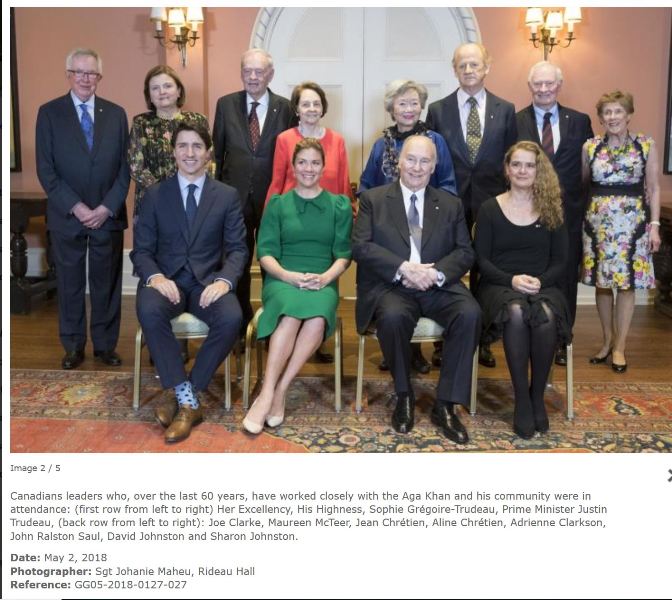
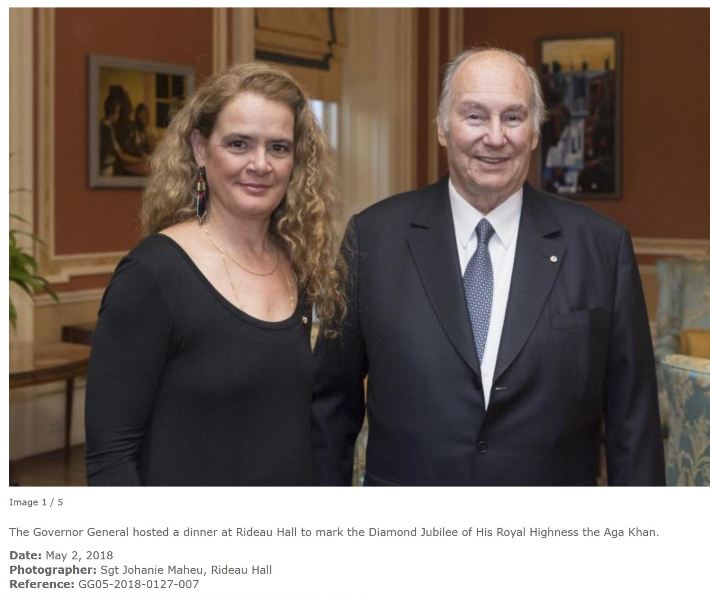
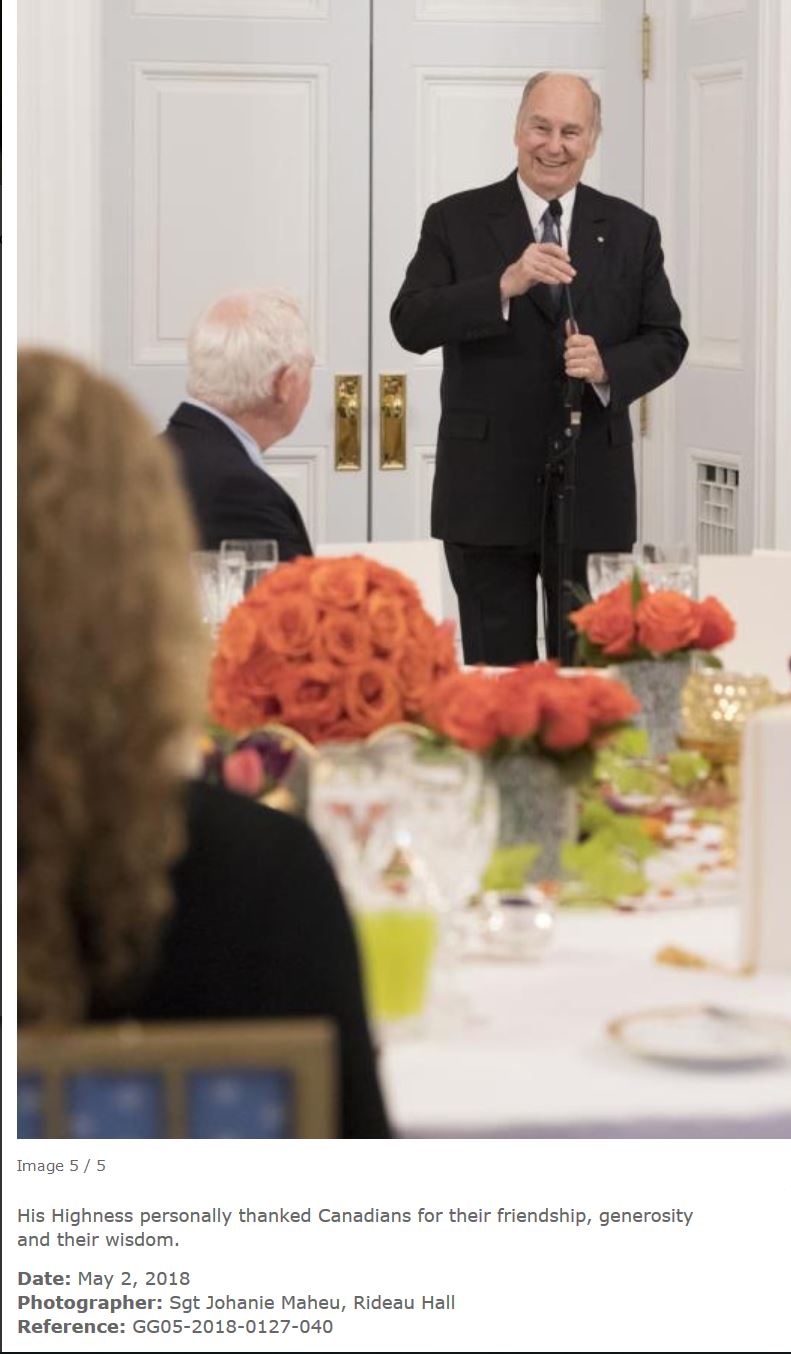
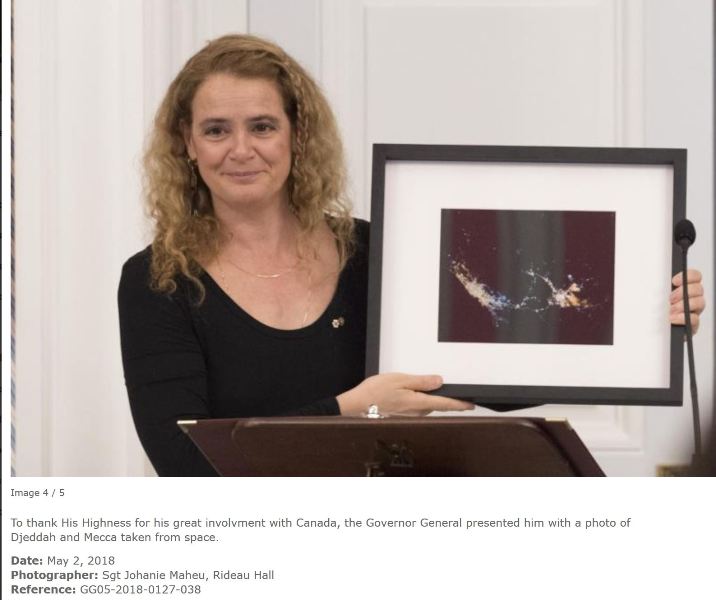
This evening, The Right Honorable Julie Payette, Governor General of Canada hosted a dinner to celebrate the Diamond Jubilee of H.H. The Aga Khan. Beside him, only the Queen of UK who is also the Queen of Canada has celebrated her Diamond Jubilee.
Princess Zahra accompanied Mowlana Hazar Imam to the dinner where several other dignitaries were invited. The Prime Minister of Canada Justin Trudeau, Ex Governor General, Adrienne Clarckson and many more.
Here are some of the pooled photos released on the Governor General's website.




https://www.straight.com/news/1069616/j ... ift-worlds
Jagdeesh Mann: The Aga Khan brought prosperity to his faithful and now looks to uplift world’s bottom billion
The Ismaili spiritual leader marks Diamond Jubilee with world tour, will be visiting Vancouver from May 5 to 7
by Jagdeesh Mann on May 3rd, 2018 at 6:03 AM
If you have ever visited an Ismaili home or business establishment, you may have come across a portrait of a gentleman who looks like an industry magnate or European aristocratic. He appears too "official" to be a family member, and then there’s the positioning of the image—usually displayed prominently at the centre of a mantle or beneath special lighting.
RELATED STORIES
World Partnership Walk reflects the best of Canadian values
Larry Young Memorial Run and World Partnership Walk will take place in Stanley Park
Prime Minister Justin Trudeau commemorates Aga Khan's diamond jubilee
Ismailis prepare to celebrate Vancouver visit of Aga Khan to B.C. Place
So who is this mysterious man?
He, of course, is none other than His Highness Prince Karim Aga Khan IV, or the Aga Khan for short—his close friends call him ‘K’, are among the who’s who of the global elite, and include Canada’s Prime Minster Justice Trudeau—and your first impression would not be far from the truth.
The Aga Khan is a billionaire investor, the owner of racehorses, stud farms, yachts, five-star hotels, and a sprawling estate on the outskirts of Paris, France, on which he resides. His vast web of for-profit companies under the office of his Aga Khan Fund for Development (AKDEF) spans the globe and generates billions in revenue per year.
But the Aga Khan is also, simultaneously, a man of God. He is the Imam (spiritual leader) of 10 million Nizari Ismailis, a branch of Shia Islam, of whom 100,000 live in Canada. He is also a direct descendent of Prophet Mohammad.
For 60 years the Aga Khan has led his flock from the throne of the Imamat, the institution of spiritual authority established by the Prophet when he appointed his son-in-law Ali as the first Imam approximately 1400 years ago. Ismailis around the world have been commemorating his Diamond Jubilee over the past 10 months during which the Aga Khan has visited his diasporic communities. The world tour continues this week with a stop in Vancouver from Saturday to Monday (May 5 to 7), and then continues to appearances in Edmonton and Calgary.
The Vancouver events are expected to attract up to 60,000 devotees from across the Pacific Northwest, who all are seeking to catch a glimpse—or if fate is kind—receive an audience with their iconic Imam, an experience on par with a Catholic meeting the Pope.
Contradiction resides at the heart of every religion. Examples of this are pervasive: how can one be a mother and a virgin (Mary) or how can a guru own 93 Rolls-Royces (Osho)? And can anyone tell me what exactly is the sound of one hand clapping, as asked by that famous Zen koan.
No less confounding is the Aga Khan, seemingly another religious paradox, though robed in western bespoke suits. A business rainmaker of fabled wealth who looks more apt to sit in a boardroom than stand behind a pulpit, he makes an odd fit next to other universally recognized spiritual leaders like the Dalai Lama or Pope Francis. On the surface, there is obvious incongruity in a jetsetter with a love for thoroughbred derbies serving as the earthly bridge to the divine bliss of the sweet hereafter.
Yet god works in mysterious ways and the Aga Khan’s own unconventional ways—the overlapping of temporal and spiritual realms, philanthropy that dovetails with business interests, and stressing local community while acting globally—have clearly uplifted his followers and informed the ethos of Ismaili life. This Ismail version of the "art of living" has not only yielded great material riches for this community, but has made it the paragon of pluralism.
Where Muslims, particularly in the West, suffer en masse from being viewed with suspicion and even hostility, Ismaili Muslims have avoided this shadow and instead are seen as progressive, education-oriented, and global citizens.
Members of this faith group live around the world in more than 25 different countries, including Canada, United States, Kenya, Tanzania, Pakistan, and Tajikstan, among others. As a community that has always lived as a minority in other countries, Ismailis are quick to adapt to their environments, and have displayed an equal dexterity to thrive in the cosmopolitan metropolises of Europe and North America as in the outposts of Africa and Asia’s emerging economies.
It was fitting that the Aga Khan was the driving force behind the establishment of Ottawa’s newly renovated home for the Centre for Pluralism. It reflected the mediating role the Ismaili community has come to play between East and West, in advancing the discourse for inclusion and openness.
Because Ismailis are a model minority, they can go unseen. An argument could be made this media-shy community prefers to blend into the background than stand out. Perhaps this harks back to the 500-year period after the 13th-century Mongol invasions when Ismailis in Persia encountered persecution and thus protected their religion through Taqiyyah, an Islamic practice that permits concealing religious beliefs.
But this combination of maintaining a low-key profile and being comfortable with diversity has also played a role in this community becoming a power player in Canada—though, again, you probably wouldn’t know it. Some of Canada’s wealthiest 0.1 percent are Ismailis, including Vancouver’s Lalji family, owners of the privately held Larco Investments, which includes West Vancouver’s Park Royal Mall in its portfolio, and estimated to be worth $3 billion.
This ethos of constantly evolving and adapting to change once again, however, starts at the top, with the Aga Khan and his embrace of modernity. But some of this credit, however, should also be extended to the Aga Khan’s grandfather, Sir Sultan Mahomed Shah Aga Khan.
In 1957, the Aga Khan’s grandfather passed over his son and instead designated him, his grandson, who was attending Harvard at the time, as the successor of his hereditary title. He chose to a skip a generation for the Imamat because as he stated, “I should be succeeded by a young man who has been brought up in the midst of the new age and who brings a new outlook on life to his office of Imam."
In this regard, the Aga Khan has lived up to his grandfather’s expectation. While Queen Elizabeth II, who marked her Diamond Jubilee in 2012, anchored the British monarchy over this same turbulent period from the end of the colonial era and into this information age with all its accompanying intrusion of paparazzi and social media, the Aga Khan has expanded his Imamat institution through it. One of his first major investments was in Kenya, in the Nation Media Group in 1960. This company listed on the Nairobi Securities Exchange is still a flourishing enterprise today, publishing content daily on multiple platforms: print, radio, TV, and digital.
His hands-on workman approach has also been instrumental in resolving crises, such as in 1972 when the Ugandan government, under the capricious strongman Idi Amin, ordered the expulsion of South Asians out of the East African country. Many Ismailis hail from the western Indian state of Gujarat—they began migrating to East Africa in the mid-19th century and of those families expelled from Uganda, many had been rooted in Africa for over a century.
The Aga Khan orchestrated the resettlement of Ismailis to various countries around the world, including Canada. Of the 6,000 South Asian refugees who emigrated to Canada, many were Ismailis who still make their homes in Vancouver.
But it may be the Aga Khan’s unconventional, and certainly risky, approach to economic development that could be the most enduring part of his legacy. The Aga Khan Development Network (AKDN), a body that employs 80,000 people across various underdeveloped regions of Africa and Asia, simultaneously engages in both philanthropy and venture capitalism, each managed respectively by the not-for-profit Aga Khan Foundation and the for-profit Aga Khan Fund for Economic Development.
Rather than donating directly to aid agencies and NGOs working in the poorest parts of the globe, the Aga Khan has taken an alternative approach to long-term sustainable development—he invests in businesses in the world’s poorest regions.
He has staked an interest in dozens of investments worldwide such as a mobile telecom in Afghanistan, a power plant in Mali, banks in Tanzania and Pakistan, a fibre optic cable company in Mauritius, and numerous others across 19 countries—there are even a couple of investments in Canada including, oddly enough, a Honda dealership in Alberta
Projects under the various divisions of the AKDN, including the for-profit and not-for profit arms, can reinforce one another where possible. In other words, money donated to the charity arm—Ismailis are supposed to pay an annual tithe of 12.5 percent of earnings to the Aga Khan—generates a tax receipt, helps build hospitals and schools in the poorest regions of the world, and may even support businesses that complement not-for-profit initiatives
The Aga Khan’s venture-capitalist-cum-philanthropist approach to development is unorthodox but it could provide much greater benefits to the world’s "bottom billion" because "he gets a multiplier effect in his investments that is really lacking in foreign aid,” as one Oxford economist noted.
This savvy rethink to the foreign aid approach to economic development has placed the AKDN in the middle of an ascendant Africa and emerging Central Asian economies—ideal positions as the Ismaili community celebrates 60 years of the Aga Khan’s leadership and begins the delicate task of looking ahead to successorship.
Speculation is that the Aga Khan’s son Rahim will be the next Imam. But it would not be surprising if most Ismailis prefer instead to look a decade down the road and envision what the 70th-anniversary Platinum Jubilee celebrations should look like for this beloved Aga Khan.
Jagdeesh Mann is a media professional and journalist based in Vancouver. Follow him on Twitter @JagdeeshMann.
Jagdeesh Mann: The Aga Khan brought prosperity to his faithful and now looks to uplift world’s bottom billion
The Ismaili spiritual leader marks Diamond Jubilee with world tour, will be visiting Vancouver from May 5 to 7
by Jagdeesh Mann on May 3rd, 2018 at 6:03 AM
If you have ever visited an Ismaili home or business establishment, you may have come across a portrait of a gentleman who looks like an industry magnate or European aristocratic. He appears too "official" to be a family member, and then there’s the positioning of the image—usually displayed prominently at the centre of a mantle or beneath special lighting.
RELATED STORIES
World Partnership Walk reflects the best of Canadian values
Larry Young Memorial Run and World Partnership Walk will take place in Stanley Park
Prime Minister Justin Trudeau commemorates Aga Khan's diamond jubilee
Ismailis prepare to celebrate Vancouver visit of Aga Khan to B.C. Place
So who is this mysterious man?
He, of course, is none other than His Highness Prince Karim Aga Khan IV, or the Aga Khan for short—his close friends call him ‘K’, are among the who’s who of the global elite, and include Canada’s Prime Minster Justice Trudeau—and your first impression would not be far from the truth.
The Aga Khan is a billionaire investor, the owner of racehorses, stud farms, yachts, five-star hotels, and a sprawling estate on the outskirts of Paris, France, on which he resides. His vast web of for-profit companies under the office of his Aga Khan Fund for Development (AKDEF) spans the globe and generates billions in revenue per year.
But the Aga Khan is also, simultaneously, a man of God. He is the Imam (spiritual leader) of 10 million Nizari Ismailis, a branch of Shia Islam, of whom 100,000 live in Canada. He is also a direct descendent of Prophet Mohammad.
For 60 years the Aga Khan has led his flock from the throne of the Imamat, the institution of spiritual authority established by the Prophet when he appointed his son-in-law Ali as the first Imam approximately 1400 years ago. Ismailis around the world have been commemorating his Diamond Jubilee over the past 10 months during which the Aga Khan has visited his diasporic communities. The world tour continues this week with a stop in Vancouver from Saturday to Monday (May 5 to 7), and then continues to appearances in Edmonton and Calgary.
The Vancouver events are expected to attract up to 60,000 devotees from across the Pacific Northwest, who all are seeking to catch a glimpse—or if fate is kind—receive an audience with their iconic Imam, an experience on par with a Catholic meeting the Pope.
Contradiction resides at the heart of every religion. Examples of this are pervasive: how can one be a mother and a virgin (Mary) or how can a guru own 93 Rolls-Royces (Osho)? And can anyone tell me what exactly is the sound of one hand clapping, as asked by that famous Zen koan.
No less confounding is the Aga Khan, seemingly another religious paradox, though robed in western bespoke suits. A business rainmaker of fabled wealth who looks more apt to sit in a boardroom than stand behind a pulpit, he makes an odd fit next to other universally recognized spiritual leaders like the Dalai Lama or Pope Francis. On the surface, there is obvious incongruity in a jetsetter with a love for thoroughbred derbies serving as the earthly bridge to the divine bliss of the sweet hereafter.
Yet god works in mysterious ways and the Aga Khan’s own unconventional ways—the overlapping of temporal and spiritual realms, philanthropy that dovetails with business interests, and stressing local community while acting globally—have clearly uplifted his followers and informed the ethos of Ismaili life. This Ismail version of the "art of living" has not only yielded great material riches for this community, but has made it the paragon of pluralism.
Where Muslims, particularly in the West, suffer en masse from being viewed with suspicion and even hostility, Ismaili Muslims have avoided this shadow and instead are seen as progressive, education-oriented, and global citizens.
Members of this faith group live around the world in more than 25 different countries, including Canada, United States, Kenya, Tanzania, Pakistan, and Tajikstan, among others. As a community that has always lived as a minority in other countries, Ismailis are quick to adapt to their environments, and have displayed an equal dexterity to thrive in the cosmopolitan metropolises of Europe and North America as in the outposts of Africa and Asia’s emerging economies.
It was fitting that the Aga Khan was the driving force behind the establishment of Ottawa’s newly renovated home for the Centre for Pluralism. It reflected the mediating role the Ismaili community has come to play between East and West, in advancing the discourse for inclusion and openness.
Because Ismailis are a model minority, they can go unseen. An argument could be made this media-shy community prefers to blend into the background than stand out. Perhaps this harks back to the 500-year period after the 13th-century Mongol invasions when Ismailis in Persia encountered persecution and thus protected their religion through Taqiyyah, an Islamic practice that permits concealing religious beliefs.
But this combination of maintaining a low-key profile and being comfortable with diversity has also played a role in this community becoming a power player in Canada—though, again, you probably wouldn’t know it. Some of Canada’s wealthiest 0.1 percent are Ismailis, including Vancouver’s Lalji family, owners of the privately held Larco Investments, which includes West Vancouver’s Park Royal Mall in its portfolio, and estimated to be worth $3 billion.
This ethos of constantly evolving and adapting to change once again, however, starts at the top, with the Aga Khan and his embrace of modernity. But some of this credit, however, should also be extended to the Aga Khan’s grandfather, Sir Sultan Mahomed Shah Aga Khan.
In 1957, the Aga Khan’s grandfather passed over his son and instead designated him, his grandson, who was attending Harvard at the time, as the successor of his hereditary title. He chose to a skip a generation for the Imamat because as he stated, “I should be succeeded by a young man who has been brought up in the midst of the new age and who brings a new outlook on life to his office of Imam."
In this regard, the Aga Khan has lived up to his grandfather’s expectation. While Queen Elizabeth II, who marked her Diamond Jubilee in 2012, anchored the British monarchy over this same turbulent period from the end of the colonial era and into this information age with all its accompanying intrusion of paparazzi and social media, the Aga Khan has expanded his Imamat institution through it. One of his first major investments was in Kenya, in the Nation Media Group in 1960. This company listed on the Nairobi Securities Exchange is still a flourishing enterprise today, publishing content daily on multiple platforms: print, radio, TV, and digital.
His hands-on workman approach has also been instrumental in resolving crises, such as in 1972 when the Ugandan government, under the capricious strongman Idi Amin, ordered the expulsion of South Asians out of the East African country. Many Ismailis hail from the western Indian state of Gujarat—they began migrating to East Africa in the mid-19th century and of those families expelled from Uganda, many had been rooted in Africa for over a century.
The Aga Khan orchestrated the resettlement of Ismailis to various countries around the world, including Canada. Of the 6,000 South Asian refugees who emigrated to Canada, many were Ismailis who still make their homes in Vancouver.
But it may be the Aga Khan’s unconventional, and certainly risky, approach to economic development that could be the most enduring part of his legacy. The Aga Khan Development Network (AKDN), a body that employs 80,000 people across various underdeveloped regions of Africa and Asia, simultaneously engages in both philanthropy and venture capitalism, each managed respectively by the not-for-profit Aga Khan Foundation and the for-profit Aga Khan Fund for Economic Development.
Rather than donating directly to aid agencies and NGOs working in the poorest parts of the globe, the Aga Khan has taken an alternative approach to long-term sustainable development—he invests in businesses in the world’s poorest regions.
He has staked an interest in dozens of investments worldwide such as a mobile telecom in Afghanistan, a power plant in Mali, banks in Tanzania and Pakistan, a fibre optic cable company in Mauritius, and numerous others across 19 countries—there are even a couple of investments in Canada including, oddly enough, a Honda dealership in Alberta
Projects under the various divisions of the AKDN, including the for-profit and not-for profit arms, can reinforce one another where possible. In other words, money donated to the charity arm—Ismailis are supposed to pay an annual tithe of 12.5 percent of earnings to the Aga Khan—generates a tax receipt, helps build hospitals and schools in the poorest regions of the world, and may even support businesses that complement not-for-profit initiatives
The Aga Khan’s venture-capitalist-cum-philanthropist approach to development is unorthodox but it could provide much greater benefits to the world’s "bottom billion" because "he gets a multiplier effect in his investments that is really lacking in foreign aid,” as one Oxford economist noted.
This savvy rethink to the foreign aid approach to economic development has placed the AKDN in the middle of an ascendant Africa and emerging Central Asian economies—ideal positions as the Ismaili community celebrates 60 years of the Aga Khan’s leadership and begins the delicate task of looking ahead to successorship.
Speculation is that the Aga Khan’s son Rahim will be the next Imam. But it would not be surprising if most Ismailis prefer instead to look a decade down the road and envision what the 70th-anniversary Platinum Jubilee celebrations should look like for this beloved Aga Khan.
Jagdeesh Mann is a media professional and journalist based in Vancouver. Follow him on Twitter @JagdeeshMann.
https://604now.com/events/aga-khan-diam ... vancouver/
Diamond Jubilee: Aga Khan In Vancouver
Aliya Hussein | @aliyazhussein | May 3, 2018
Ismaili Muslims from all over British Columbia are getting ready celebrate the arrival of the Aga Khan in Canada, to commemorate the Diamond Jubilee of him being Imam.
He will be in Canada May 1st, and will be making an appearance in Vancouver May 5th and 6th. Around 20,000 people from all over British Columbia will be showing up to B.C. Place to honour their Imam.
RELATED: Be The Change Vancouver 2018
“The Diamond Jubilee provides an opportunity for people everywhere, here in Canada and elsewhere, to re-dedicate themselves to the ethics and values that underpin our partnerships with communities around the world to help improve quality of life. It is an opportunity to give back and look forward,” said Mahmoud Eboo, Aga Khan Development Network Representative to Canada.
The Imam celebrated his 60th anniversary of being the spiritual leader to over 15 million Ismaili Muslims globally on July 11, 2017.
About The Aga Khan
The Aga Khan, otherwise known as Prince Shah Karim Al Hussaini, is the 49th hereditary leader of Ismailism.
He succeeded his grandfather, His Highness Sultan Mohammed Shah Aga Khan III, at the young age of 20.
Ismailism is a branch of Shia Islam. Currently, Ismaili Muslims live in over 25 different countries around the world. There an an estimated 100,000 Ismailis currently living in Canada.
The spiritual leader has been in power since 1957, and is known to be an advocate for items such as fighting global poverty, advancing women’s status, and honouring Islamic Art and Architecture.
aga khan
Photo: AKDN
He’s the head of the Aga Khan Development Network, which is a group of private, non-denominational agencies that address the social, economic, and cultural developments from 30 countries from around the world.
The Imam is a dedicated humanitarian; he is an advocate for development and charitable institutions in neglected parts of the world.
In 2010, His Highness was granted with a tribute of Honorary Canadian Citizenship. In February 2014, the Aga Khan was the first faith leader to address a joint session of Canadian Parliament.
Aga Khan’s 60th Jubilee Vancouver Visit
Location: B.C. Place - 777 Pacific Boulevard, Vancouver
Date: Saturday May 5th, 2018
Diamond Jubilee: Aga Khan In Vancouver
Aliya Hussein | @aliyazhussein | May 3, 2018
Ismaili Muslims from all over British Columbia are getting ready celebrate the arrival of the Aga Khan in Canada, to commemorate the Diamond Jubilee of him being Imam.
He will be in Canada May 1st, and will be making an appearance in Vancouver May 5th and 6th. Around 20,000 people from all over British Columbia will be showing up to B.C. Place to honour their Imam.
RELATED: Be The Change Vancouver 2018
“The Diamond Jubilee provides an opportunity for people everywhere, here in Canada and elsewhere, to re-dedicate themselves to the ethics and values that underpin our partnerships with communities around the world to help improve quality of life. It is an opportunity to give back and look forward,” said Mahmoud Eboo, Aga Khan Development Network Representative to Canada.
The Imam celebrated his 60th anniversary of being the spiritual leader to over 15 million Ismaili Muslims globally on July 11, 2017.
About The Aga Khan
The Aga Khan, otherwise known as Prince Shah Karim Al Hussaini, is the 49th hereditary leader of Ismailism.
He succeeded his grandfather, His Highness Sultan Mohammed Shah Aga Khan III, at the young age of 20.
Ismailism is a branch of Shia Islam. Currently, Ismaili Muslims live in over 25 different countries around the world. There an an estimated 100,000 Ismailis currently living in Canada.
The spiritual leader has been in power since 1957, and is known to be an advocate for items such as fighting global poverty, advancing women’s status, and honouring Islamic Art and Architecture.
aga khan
Photo: AKDN
He’s the head of the Aga Khan Development Network, which is a group of private, non-denominational agencies that address the social, economic, and cultural developments from 30 countries from around the world.
The Imam is a dedicated humanitarian; he is an advocate for development and charitable institutions in neglected parts of the world.
In 2010, His Highness was granted with a tribute of Honorary Canadian Citizenship. In February 2014, the Aga Khan was the first faith leader to address a joint session of Canadian Parliament.
Aga Khan’s 60th Jubilee Vancouver Visit
Location: B.C. Place - 777 Pacific Boulevard, Vancouver
Date: Saturday May 5th, 2018
2018-05-02: Ottawa, Canada - A series of pictures of H.H. The Aga Khan at Governor General dinner at Rideau Hall in Ottawa, has been released from government and institutional sources. We share them here as received. Princess Zahra, former Governors General and former Prime Ministers, many known guests which you will recognise in the photos. In her speech, Gov. Gen. Julie Payette, a former astronaut, called Mowlana Hazar Imam a Beacon of Light and Mowla thanked Canada for its support.
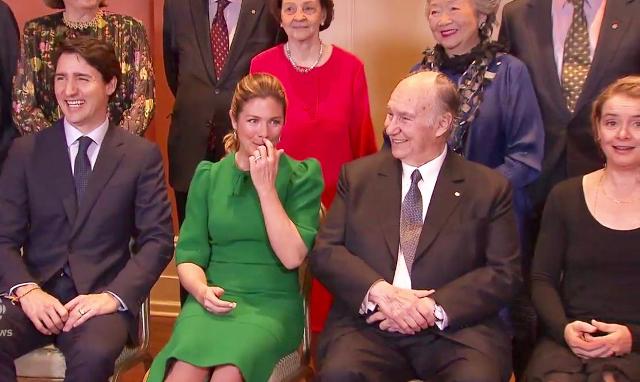
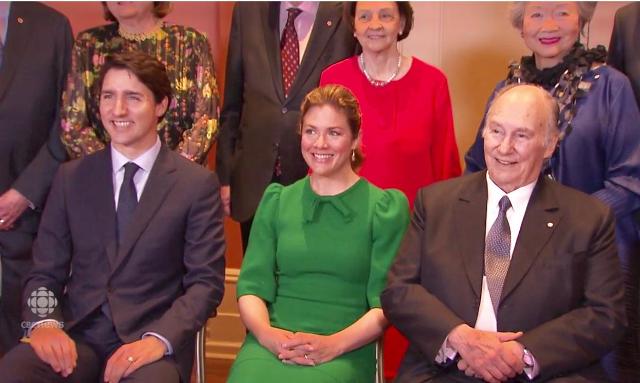
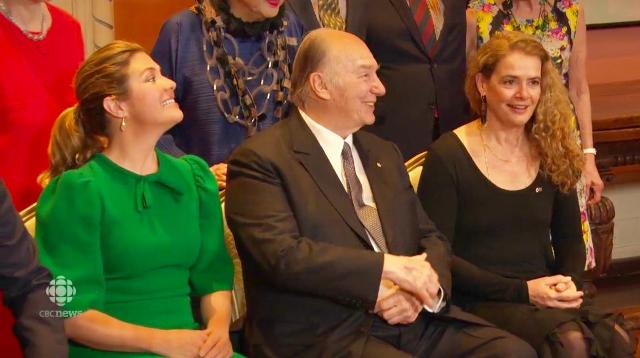
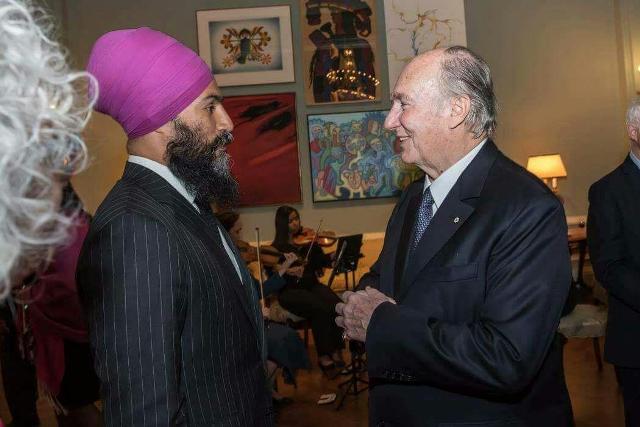
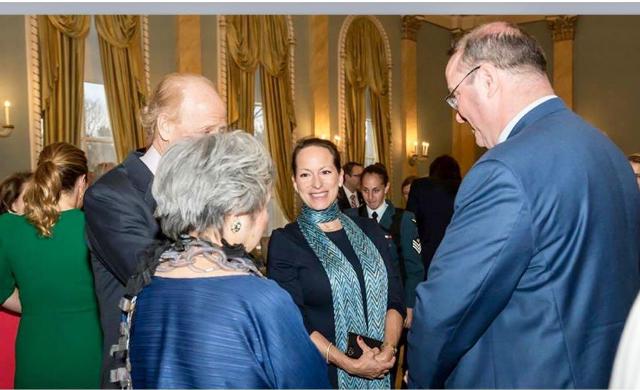
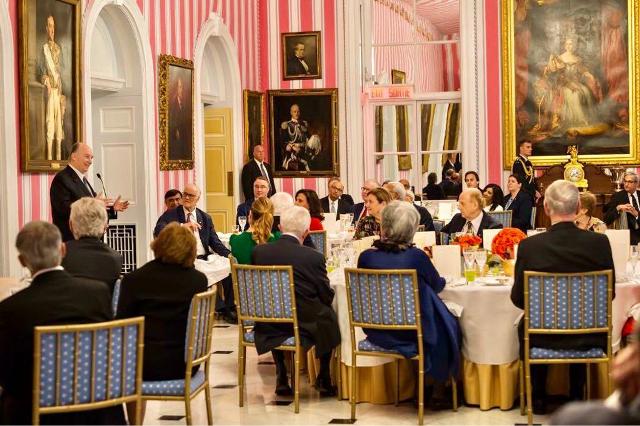
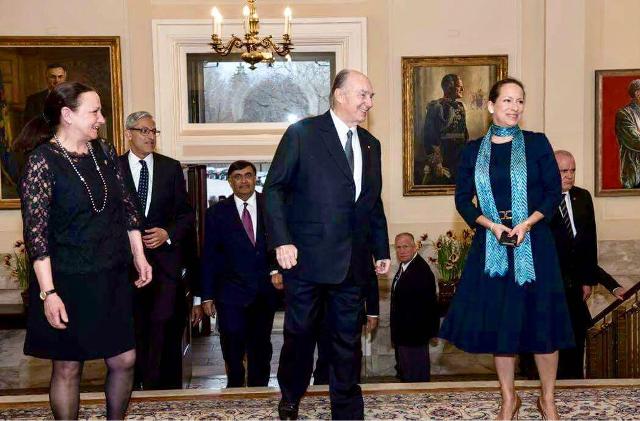
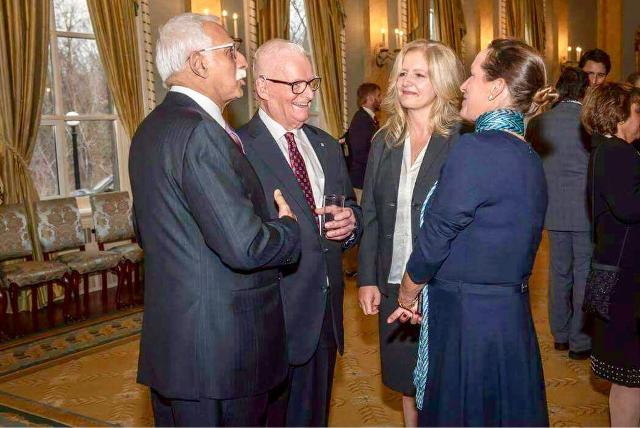
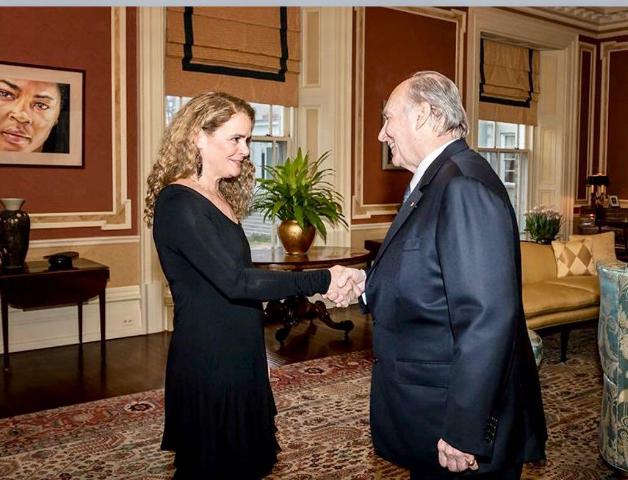
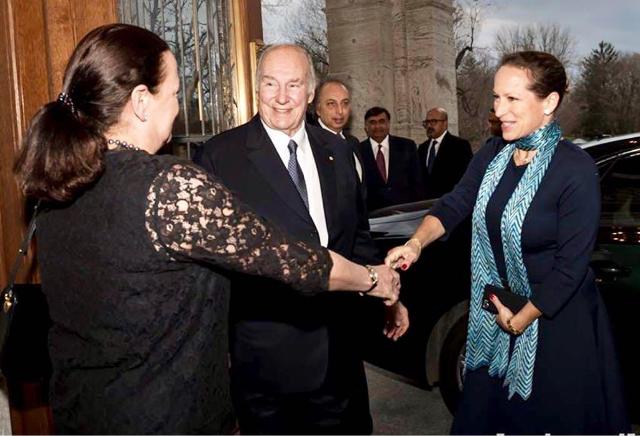
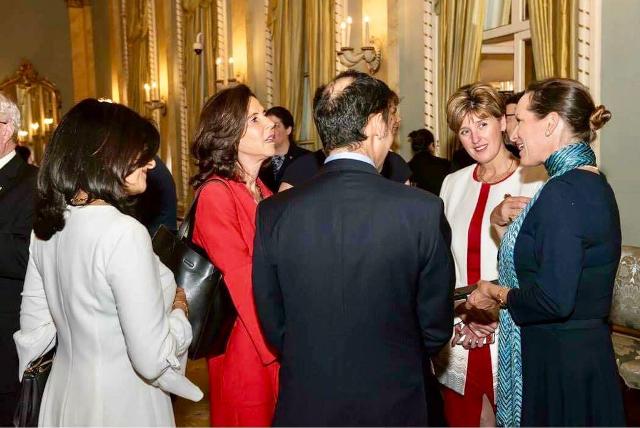
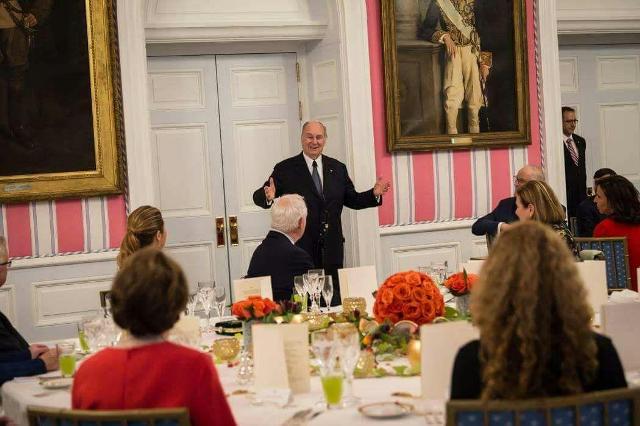
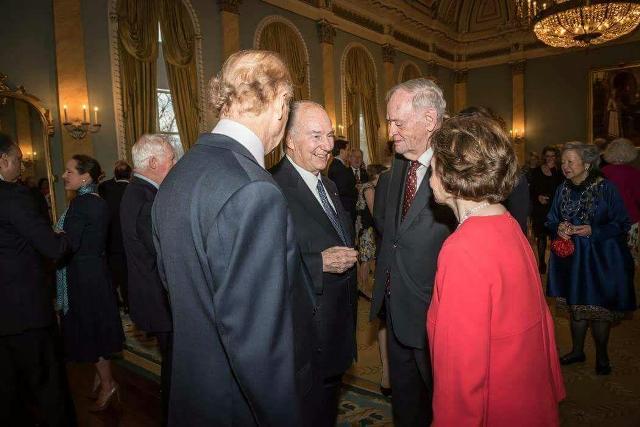















A “beacon of light”: Mawlana Hazar Imam hosted at Rideau Hall during his Diamond Jubilee visit to Canada
Earlier this evening, Her Excellency the Right Honourable Julie Payette, Governor General of Canada, hosted a dinner at Rideau Hall in honour of Mawlana Hazar Imam’s Diamond Jubilee.
Guests included Princess Zahra Aga Khan, Prime Minister Justin Trudeau, past Prime Ministers Jean Chrétien and Joe Clark, and past Governors General David Johnston and Adrienne Clarkson, as well as Jamati and AKDN leaders.
Guests were seated at tables that were thoughtfully named after the various cities across Canada where Ismailis are significant in numbers. Mawlana Hazar Imam’s head table, which included the current and former Governors General and Prime Ministers, was named after the city of Burnaby in British Columbia to reflect one of the first major settlement areas of Ismailis.
During her remarks, Governor General Payette acknowledged Mawlana Hazar Imam’s leadership and contributions around the world.
“Your Highness, we know, everybody in this crowd knows, that you lead by example, that the work that you’ve done tirelessly for six decades has been groundbreaking. We know that you are trying very hard to improve the quality of life of people in less fortunate places in the world, and that you promote tolerance and education above all.”
Payette, a former astronaut, also recounted an anecdote about a spaceflight in which she saw Mecca, gleaming brightly, and concluded by saying to Mawlana Hazar Imam that it was a beacon of light, “just as you are.”
Mawlana Hazar Imam then addressed the guests, expressing his gratitude towards Canada.
“Thank you Canada. Thank you Canada for the advice, the support, the encouragement you've given to our institutions. I see Ismaili leaders from Canada … who are wonderful examples of Canadian knowledge, Canadian wisdom, Canadian comprehension, and who are building on the best of Canadian values. Thank you very much. Thank you."
https://the.ismaili/diamond-jubilee/%E2 ... nd-jubilee
Earlier this evening, Her Excellency the Right Honourable Julie Payette, Governor General of Canada, hosted a dinner at Rideau Hall in honour of Mawlana Hazar Imam’s Diamond Jubilee.
Guests included Princess Zahra Aga Khan, Prime Minister Justin Trudeau, past Prime Ministers Jean Chrétien and Joe Clark, and past Governors General David Johnston and Adrienne Clarkson, as well as Jamati and AKDN leaders.
Guests were seated at tables that were thoughtfully named after the various cities across Canada where Ismailis are significant in numbers. Mawlana Hazar Imam’s head table, which included the current and former Governors General and Prime Ministers, was named after the city of Burnaby in British Columbia to reflect one of the first major settlement areas of Ismailis.
During her remarks, Governor General Payette acknowledged Mawlana Hazar Imam’s leadership and contributions around the world.
“Your Highness, we know, everybody in this crowd knows, that you lead by example, that the work that you’ve done tirelessly for six decades has been groundbreaking. We know that you are trying very hard to improve the quality of life of people in less fortunate places in the world, and that you promote tolerance and education above all.”
Payette, a former astronaut, also recounted an anecdote about a spaceflight in which she saw Mecca, gleaming brightly, and concluded by saying to Mawlana Hazar Imam that it was a beacon of light, “just as you are.”
Mawlana Hazar Imam then addressed the guests, expressing his gratitude towards Canada.
“Thank you Canada. Thank you Canada for the advice, the support, the encouragement you've given to our institutions. I see Ismaili leaders from Canada … who are wonderful examples of Canadian knowledge, Canadian wisdom, Canadian comprehension, and who are building on the best of Canadian values. Thank you very much. Thank you."
https://the.ismaili/diamond-jubilee/%E2 ... nd-jubilee
Honoured to celebrate the #DiamondJubilee of His Highness the Aga Khan with Prime Minister @JustinTrudeau, Governor General @GGJuliePayette, and Ismaili Parliamentarians and elected officials
https://twitter.com/viraniarif/status/9 ... 6154038272
******
Foreign Policy CAN
✔ @CanadaFP
The Government of Canada is pleased to announce that H.E. Marc-André Blanchard, Ambassador and Permanent Representative of Canada to the @UN, has been appointed as Canada’s Representative to the Ismaili Imamat #AgaKhan @blanchardCanada @akdn
*******
On behalf of the Conservative Opposition I paid tribute to the #AgaKhan on the occasion of his Diamond Jubilee and thanked him for his compassion & global leadership.
https://www.youtube.com/watch?v=4u2c_bK9kAo …
*******
https://twitter.com/viraniarif/status/9 ... 6154038272
******
Foreign Policy CAN
✔ @CanadaFP
The Government of Canada is pleased to announce that H.E. Marc-André Blanchard, Ambassador and Permanent Representative of Canada to the @UN, has been appointed as Canada’s Representative to the Ismaili Imamat #AgaKhan @blanchardCanada @akdn
*******
On behalf of the Conservative Opposition I paid tribute to the #AgaKhan on the occasion of his Diamond Jubilee and thanked him for his compassion & global leadership.
https://www.youtube.com/watch?v=4u2c_bK9kAo …
*******
Last edited by kmaherali on Fri May 04, 2018 11:20 am, edited 2 times in total.
Dinning: Aga Khan's visit reminds us of the importance of compassion
By Jim Dinning
After a winter we thought would never end, we’re eager to enjoy the beginning of spring weather with time spent outside, in the garden and on the golf course.
For members of our Ismaili Muslim community in Western Canada, spring brings the joy of celebrating the diamond jubilee of the Aga Khan’s spiritual leadership of the community, as he visits Calgary and Vancouver.
As I celebrate with my Ismaili friends, I am struck by the commitment of the women and men of the community who are driven by the values of pluralism and compassion that are advocated by the Aga Khan. I am awed by the selfless contributions made by Ismailis to the fabric of Alberta society over the past 50 years.
In 1972, when Idi Amin expelled Hindu, Muslim, Sikh and Christian Ugandans of Asian ethnicity, his highness worked with Canada to find a home for these newly stateless refugees.
When the Aga Khan’s (and Canada’s) efforts secured the safety of many, including Ugandan Ismailis, he called on Canada’s new Ismaili community to put down roots and to advance the quality of life of their fellow citizens, regardless of faith or background.
The seeds planted by the Aga Khan took root, and the Ismaili community has excelled. The ethic of volunteerism that the community is known for, and the commitment to improving the lives of the poorest and most vulnerable, have made a big difference here in Calgary and the rest of Alberta.
Those effort are also a model of how quiet, determined grassroots work can shape a more compassionate and equitable society.
In my political, business and civic activities, I have engaged with Ismailis from all walks of life, as they offered their time, knowledge and material resources to improve our province and country.
When he received an honorary degree from the University of Alberta in 2009 for his contributions to humanity, the Aga Khan promised to establish a public garden in Edmonton, inspired by Islamic and Canadian landscape architecture traditions.
The garden, set to open to the public in a few weeks, will be a one-of-a-kind oasis where Albertans will seek inspiration, learn more about conservation, relax, and engage in respectful dialogue (something we need more of in these turbulent days.)
It was this commitment to peaceful, respectful dialogue and engagement that led to the establishment of the Global Centre for Pluralism in Ottawa, a partnership between the Ismaili Imamat and the government of Canada. The centre was established in our country because we have persisted in building a pluralistic society.
While Canadians who are Ismailis, and the Aga Khan, have contributed to enriching Canada, they continue to work together internationally. I have seen first hand the work of the Aga Khan Development Network. It’s a non-denominational development agency that is a partner of choice for governments around the world. Its long-term, community-based focus is recognized by the World Bank as the gold standard.
Albertans contributed to the success of the Aga Khan Development Network in its earlier years when the provincial and federal governments funded work on maternal health and education initiatives that make a difference in the lives of women and children in some of the most vulnerable countries in the world.
In 2010, when Stephen Harper made the Aga Khan an honorary Canadian citizen, the former prime minister spoke of the Aga Khan’s and the Ismaili community’s untiring dedication to making the world safe for democracy by first making it safe for diversity.
On the Aga Khan’s diamond jubilee, I thank those in Calgary’s and Alberta’s Ismaili community for their tremendous contributions to Canadian life.
Jim Dinning is a former Alberta finance minister and chancellor emeritus of the University of Calgary.
http://calgaryherald.com/opinion/column ... compassion
******
Diamond Jubilee: Aga Khan In Vancouver
Ismaili Muslims from all over British Columbia are getting ready celebrate the arrival of the Aga Khan in Canada, to commemorate the Diamond Jubilee of him being Imam.
He will be in Canada May 1st, and will be making an appearance in Vancouver May 5th and 6th. Around 20,000 people from all over British Columbia will be showing up to B.C. Place to honour their Imam.
“The Diamond Jubilee provides an opportunity for people everywhere, here in Canada and elsewhere, to re-dedicate themselves to the ethics and values that underpin our partnerships with communities around the world to help improve quality of life. It is an opportunity to give back and look forward,” said Mahmoud Eboo, Aga Khan Development Network Representative to Canada.
The Imam celebrated his 60th anniversary of being the spiritual leader to over 15 million Ismaili Muslims globally on July 11, 2017.
More...
https://604now.com/events/aga-khan-diam ... vancouver/
By Jim Dinning
After a winter we thought would never end, we’re eager to enjoy the beginning of spring weather with time spent outside, in the garden and on the golf course.
For members of our Ismaili Muslim community in Western Canada, spring brings the joy of celebrating the diamond jubilee of the Aga Khan’s spiritual leadership of the community, as he visits Calgary and Vancouver.
As I celebrate with my Ismaili friends, I am struck by the commitment of the women and men of the community who are driven by the values of pluralism and compassion that are advocated by the Aga Khan. I am awed by the selfless contributions made by Ismailis to the fabric of Alberta society over the past 50 years.
In 1972, when Idi Amin expelled Hindu, Muslim, Sikh and Christian Ugandans of Asian ethnicity, his highness worked with Canada to find a home for these newly stateless refugees.
When the Aga Khan’s (and Canada’s) efforts secured the safety of many, including Ugandan Ismailis, he called on Canada’s new Ismaili community to put down roots and to advance the quality of life of their fellow citizens, regardless of faith or background.
The seeds planted by the Aga Khan took root, and the Ismaili community has excelled. The ethic of volunteerism that the community is known for, and the commitment to improving the lives of the poorest and most vulnerable, have made a big difference here in Calgary and the rest of Alberta.
Those effort are also a model of how quiet, determined grassroots work can shape a more compassionate and equitable society.
In my political, business and civic activities, I have engaged with Ismailis from all walks of life, as they offered their time, knowledge and material resources to improve our province and country.
When he received an honorary degree from the University of Alberta in 2009 for his contributions to humanity, the Aga Khan promised to establish a public garden in Edmonton, inspired by Islamic and Canadian landscape architecture traditions.
The garden, set to open to the public in a few weeks, will be a one-of-a-kind oasis where Albertans will seek inspiration, learn more about conservation, relax, and engage in respectful dialogue (something we need more of in these turbulent days.)
It was this commitment to peaceful, respectful dialogue and engagement that led to the establishment of the Global Centre for Pluralism in Ottawa, a partnership between the Ismaili Imamat and the government of Canada. The centre was established in our country because we have persisted in building a pluralistic society.
While Canadians who are Ismailis, and the Aga Khan, have contributed to enriching Canada, they continue to work together internationally. I have seen first hand the work of the Aga Khan Development Network. It’s a non-denominational development agency that is a partner of choice for governments around the world. Its long-term, community-based focus is recognized by the World Bank as the gold standard.
Albertans contributed to the success of the Aga Khan Development Network in its earlier years when the provincial and federal governments funded work on maternal health and education initiatives that make a difference in the lives of women and children in some of the most vulnerable countries in the world.
In 2010, when Stephen Harper made the Aga Khan an honorary Canadian citizen, the former prime minister spoke of the Aga Khan’s and the Ismaili community’s untiring dedication to making the world safe for democracy by first making it safe for diversity.
On the Aga Khan’s diamond jubilee, I thank those in Calgary’s and Alberta’s Ismaili community for their tremendous contributions to Canadian life.
Jim Dinning is a former Alberta finance minister and chancellor emeritus of the University of Calgary.
http://calgaryherald.com/opinion/column ... compassion
******
Diamond Jubilee: Aga Khan In Vancouver
Ismaili Muslims from all over British Columbia are getting ready celebrate the arrival of the Aga Khan in Canada, to commemorate the Diamond Jubilee of him being Imam.
He will be in Canada May 1st, and will be making an appearance in Vancouver May 5th and 6th. Around 20,000 people from all over British Columbia will be showing up to B.C. Place to honour their Imam.
“The Diamond Jubilee provides an opportunity for people everywhere, here in Canada and elsewhere, to re-dedicate themselves to the ethics and values that underpin our partnerships with communities around the world to help improve quality of life. It is an opportunity to give back and look forward,” said Mahmoud Eboo, Aga Khan Development Network Representative to Canada.
The Imam celebrated his 60th anniversary of being the spiritual leader to over 15 million Ismaili Muslims globally on July 11, 2017.
More...
https://604now.com/events/aga-khan-diam ... vancouver/
http://www.nsnews.com/community/north-s ... 1.23291581
North Shore Ismaili community celebrates the Aga Khan's legacy
Fabian Dawson / Contributing writer
May 4, 2018 12:00 PM
Like most Ismailis who call the North Shore home, Farhan Lalani’s life story is one of faith, growth and charity.
His family’s forced exodus from Idi Amin’s Uganda in the 1970s brought them to an inviting Canada along with thousands of others, whose homes, businesses and properties were seized by a brutal regime.
Here, they started again from scratch to rebuild their lives armed with a simple message from their spiritual leader, the Aga Khan, who told his displaced following to grow and give back to Canada.
“We grew up with little …but my parents ensured we had a lot of the Aga Khan’s teachings in everything we did. …The Aga Khan is never far from anything we do as a family,” said Lalani, who lives in North Vancouver with his wife Alison and their sons Cairo and Xavier.
This weekend, Lalani, the CEO of Market One Media Group, one of Canada’s top financial media companies, will be among the thousands of Ismailis who will be at BC Place to celebrate the Diamond Jubilee of the Aga Khan.
The Aga Khan, a direct descendant of the Prophet Muhammad, is the spiritual leader of 15 million people around the world, including 120,000 in Canada, who belong to the Ismaili faith. They’re a global, multi-ethnic community whose members — comprising a wide diversity of cultures, languages and nationalities — live in Central Asia, the Middle East, South Asia, sub-Saharan Africa, Europe and North America.
In B.C., there are about 20,000 Ismailis, a third of whom – whose names dominate industry, real estate development, capital markets and local charities – live on the North Shore. “The Aga Khan’s Diamond Jubilee visit to Ottawa, Vancouver and Calgary is a very significant event for all of us,” said Samir Manji, president of the Ismaili Council for BC.
“His Highness inspires us with pluralism, humanitarianism and philanthropy. … It is all about making what we can, keeping what we need and giving away the rest to make a better world,” said Manji, a West Vancouver-based entrepreneur, who helped build over two dozen senior citizen communities across Canada.
Manji is especially proud of his community’s ongoing pledge to donate a million hours of service to improve the quality of life of all Canadians.
“It’s a demonstration of our commitment to Canada,” said Manji.
pic
“The Aga Khan is never far from anything we do as a family,” says Farhan Lalani, CEO of Market One Media Group, pictured here with his wife Alison and their sons Cairo and Xavier at their North Vancouver home - photo supplied
As of March, the Ismaili Muslim community volunteered a total of 1,127,549 hours of service across the country in just over six months as part of Canada’s 150th anniversary and the Aga Khan’s Diamond Jubilee year.
Volunteers from Metro Vancouver have provided over 200,000 of service hours in the Lower Mainland alone in partnership with the Surrey Food Bank, the Boys and Girls Club, the YWCA and Habitat for Humanity among others.
This massive show of giving comes as no surprise to Don Bell, the former North Vancouver District mayor, who also served as North Vancouver’s member of Parliament.
“I am always in awe of what this community has achieved quietly. ... They use their faith and industry to give where they live,” said Bell, a current North Vancouver City councillor.
Bell said he first met with the local Ismaili community in the early 1970s over a zoning issue.
“They were using a warehouse as a place to congregate and pray, ... they then moved from school hall to school hall as we began working together to find a permanent Jamatkhana or place of worship,” he said.
In 1992, Bell helped the community purchase the site of the Lions Gate Tennis Club on Gladwin Drive, which today is home to a 43,000-square-feet architectural superlative known as the Lions Gate Jamatkhana.
The $3-million award-winning project, whose portals take their cue from First Nations architecture, comprises a prayer hall, ante-room, foyer, support space, classrooms, library, commercial kitchen, three squash courts, a multipurpose hall with stage for performing arts, and special lighting for sports and social events.
The Lions Gate Jamatkhana, one of 17 such facilities in British Columbia, was designed by North Vancouver-based Ismaili architect, Farouk Noormohamed, who is globally renowned for his work building airports, embassies, Ismaili centres, private residences and hotels worldwide.
Deep Cove resident Sam Hirji’s passage to Canada from the Ugandan upheaval of the ’70s took him to a refugee camp in Italy and later to an immigration housing centre in the southern United States.
“It was a tough time for all Ismailis and I firmly believe it is our faith in the Aga Khan that has made us what we are today,” said Hirji, who founded the award winning Samco Printers in Vancouver.
“The Aga Khan’s tireless advocacy to bridge the humanitarian-development divide has always been a guiding beacon for me; during my early years in Uganda, then as a refugee to Italy and the United States, and now as a businessman in British Columbia.”
Working behind the scenes as one of the thousands of volunteers facilitating this weekend’s Diamond Jubilee visit of the Aga Khan, Hirji said it’s unfortunate that much of today’s worldview of Islam is wrapped around terrorism and extremism.
“More than ever before our job is to showcase the Islam that creates a legacy of hospitals, schools, business enterprises and cultural institutions led by the Aga Khan,” he said.
It is not only Ismailis who get their inspiration from the Aga Khan.
In a statement to the North Shore News, Rev. J. Michael Miller, the Archbishop of Vancouver said the Aga Khan’s philanthropy demonstrates to the world that religious convictions have a vital role to play in secular society.
“The Aga Khan’s decades of work in fighting poverty, encouraging peace, and promoting education and religious understanding offer a much needed witness to common belief in loving God and our neighbour,” said the archbishop.
This weekend at BC Place Stadium over 100,000 Ismailis are expected to attend a series of events led by the Aga Khan – a global ambassador of Canadian values whose legacy is the spirit of connection.
North Shore Ismaili community celebrates the Aga Khan's legacy
Fabian Dawson / Contributing writer
May 4, 2018 12:00 PM
Like most Ismailis who call the North Shore home, Farhan Lalani’s life story is one of faith, growth and charity.
His family’s forced exodus from Idi Amin’s Uganda in the 1970s brought them to an inviting Canada along with thousands of others, whose homes, businesses and properties were seized by a brutal regime.
Here, they started again from scratch to rebuild their lives armed with a simple message from their spiritual leader, the Aga Khan, who told his displaced following to grow and give back to Canada.
“We grew up with little …but my parents ensured we had a lot of the Aga Khan’s teachings in everything we did. …The Aga Khan is never far from anything we do as a family,” said Lalani, who lives in North Vancouver with his wife Alison and their sons Cairo and Xavier.
This weekend, Lalani, the CEO of Market One Media Group, one of Canada’s top financial media companies, will be among the thousands of Ismailis who will be at BC Place to celebrate the Diamond Jubilee of the Aga Khan.
The Aga Khan, a direct descendant of the Prophet Muhammad, is the spiritual leader of 15 million people around the world, including 120,000 in Canada, who belong to the Ismaili faith. They’re a global, multi-ethnic community whose members — comprising a wide diversity of cultures, languages and nationalities — live in Central Asia, the Middle East, South Asia, sub-Saharan Africa, Europe and North America.
In B.C., there are about 20,000 Ismailis, a third of whom – whose names dominate industry, real estate development, capital markets and local charities – live on the North Shore. “The Aga Khan’s Diamond Jubilee visit to Ottawa, Vancouver and Calgary is a very significant event for all of us,” said Samir Manji, president of the Ismaili Council for BC.
“His Highness inspires us with pluralism, humanitarianism and philanthropy. … It is all about making what we can, keeping what we need and giving away the rest to make a better world,” said Manji, a West Vancouver-based entrepreneur, who helped build over two dozen senior citizen communities across Canada.
Manji is especially proud of his community’s ongoing pledge to donate a million hours of service to improve the quality of life of all Canadians.
“It’s a demonstration of our commitment to Canada,” said Manji.
pic
“The Aga Khan is never far from anything we do as a family,” says Farhan Lalani, CEO of Market One Media Group, pictured here with his wife Alison and their sons Cairo and Xavier at their North Vancouver home - photo supplied
As of March, the Ismaili Muslim community volunteered a total of 1,127,549 hours of service across the country in just over six months as part of Canada’s 150th anniversary and the Aga Khan’s Diamond Jubilee year.
Volunteers from Metro Vancouver have provided over 200,000 of service hours in the Lower Mainland alone in partnership with the Surrey Food Bank, the Boys and Girls Club, the YWCA and Habitat for Humanity among others.
This massive show of giving comes as no surprise to Don Bell, the former North Vancouver District mayor, who also served as North Vancouver’s member of Parliament.
“I am always in awe of what this community has achieved quietly. ... They use their faith and industry to give where they live,” said Bell, a current North Vancouver City councillor.
Bell said he first met with the local Ismaili community in the early 1970s over a zoning issue.
“They were using a warehouse as a place to congregate and pray, ... they then moved from school hall to school hall as we began working together to find a permanent Jamatkhana or place of worship,” he said.
In 1992, Bell helped the community purchase the site of the Lions Gate Tennis Club on Gladwin Drive, which today is home to a 43,000-square-feet architectural superlative known as the Lions Gate Jamatkhana.
The $3-million award-winning project, whose portals take their cue from First Nations architecture, comprises a prayer hall, ante-room, foyer, support space, classrooms, library, commercial kitchen, three squash courts, a multipurpose hall with stage for performing arts, and special lighting for sports and social events.
The Lions Gate Jamatkhana, one of 17 such facilities in British Columbia, was designed by North Vancouver-based Ismaili architect, Farouk Noormohamed, who is globally renowned for his work building airports, embassies, Ismaili centres, private residences and hotels worldwide.
Deep Cove resident Sam Hirji’s passage to Canada from the Ugandan upheaval of the ’70s took him to a refugee camp in Italy and later to an immigration housing centre in the southern United States.
“It was a tough time for all Ismailis and I firmly believe it is our faith in the Aga Khan that has made us what we are today,” said Hirji, who founded the award winning Samco Printers in Vancouver.
“The Aga Khan’s tireless advocacy to bridge the humanitarian-development divide has always been a guiding beacon for me; during my early years in Uganda, then as a refugee to Italy and the United States, and now as a businessman in British Columbia.”
Working behind the scenes as one of the thousands of volunteers facilitating this weekend’s Diamond Jubilee visit of the Aga Khan, Hirji said it’s unfortunate that much of today’s worldview of Islam is wrapped around terrorism and extremism.
“More than ever before our job is to showcase the Islam that creates a legacy of hospitals, schools, business enterprises and cultural institutions led by the Aga Khan,” he said.
It is not only Ismailis who get their inspiration from the Aga Khan.
In a statement to the North Shore News, Rev. J. Michael Miller, the Archbishop of Vancouver said the Aga Khan’s philanthropy demonstrates to the world that religious convictions have a vital role to play in secular society.
“The Aga Khan’s decades of work in fighting poverty, encouraging peace, and promoting education and religious understanding offer a much needed witness to common belief in loving God and our neighbour,” said the archbishop.
This weekend at BC Place Stadium over 100,000 Ismailis are expected to attend a series of events led by the Aga Khan – a global ambassador of Canadian values whose legacy is the spirit of connection.
Last edited by Admin on Sat May 05, 2018 11:27 am, edited 1 time in total.
2018, May 2nd and 3rd in Ottawa, Canada
H.H. The Aga Khan leaving the Center for Global Pluralism.
Rain is Blessings. At least it was at that moment when the 7 Murids standing outside the GCP saw their Imam-e-Zaman, Mowla Mushkil Khusha!

When H.H. The Aga Khan, Mowlana Hazar Imam, left the Delegation of the Ismaili Imamate for the dinner at the Governor General's residence at Rideau Hall, he made a point to wave at his Murids waiting outside. The 15 or so Murids waiting to see their Imam had come from various cities and countries, truly representing in their heart the One Jamat concept so dear to Mowla.
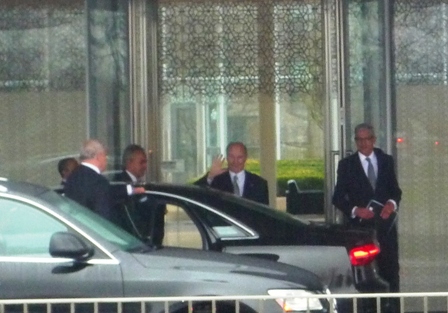
On May 3rd, Princess Zahra coming out of the DII building. She waved before sitting in the car and also from her car to the Murids waiting outside. Princess Zahra has stood strong and dedicated in her service to the Jamat and the Imam
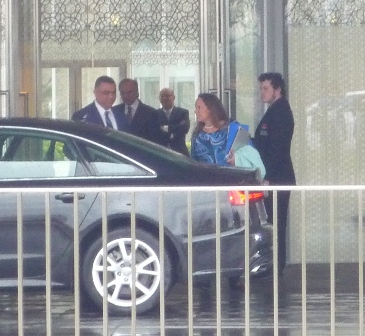
H.H. The Aga Khan leaving the Center for Global Pluralism.
Rain is Blessings. At least it was at that moment when the 7 Murids standing outside the GCP saw their Imam-e-Zaman, Mowla Mushkil Khusha!

When H.H. The Aga Khan, Mowlana Hazar Imam, left the Delegation of the Ismaili Imamate for the dinner at the Governor General's residence at Rideau Hall, he made a point to wave at his Murids waiting outside. The 15 or so Murids waiting to see their Imam had come from various cities and countries, truly representing in their heart the One Jamat concept so dear to Mowla.

On May 3rd, Princess Zahra coming out of the DII building. She waved before sitting in the car and also from her car to the Murids waiting outside. Princess Zahra has stood strong and dedicated in her service to the Jamat and the Imam

Mawlana Hazar Imam arrives in Vancouver for second leg of Diamond Jubilee visit to Canada
Mawlana Hazar Imam completed the first leg of his Diamond Jubilee visit to Canada, departing from Ottawa on 4 May after having completed several days of proceedings related to the work of the Aga Khan Development Network and Global Centre for Pluralism. On his departure, Hazar Imam expressed his appreciation for the work of the institutions and highlighted the importance of continuing to build strong institutions in Canada.
Later that day, Mawlana Hazar Imam arrived in Vancouver in preparation for his visits with the Western Canadian Jamats. He was received at the airport by British Columbia Lieutenant Governor Janet Austin and Vancouver Mayor Gregor Robertson, along with leaders and representatives of the Jamat.
While in Vancouver, Mawlana Hazar Imam is expected to meet with the Jamat of British Columbia after which he will travel to Calgary to meet with the Jamats of Edmonton and the Prairies.
Over the course of the previous few weeks, the Western Canadian Jamat was busy preparing and rejoicing in anticipation of Mawlana Hazar Imam’s visit, and his arrival was an occasion of great happiness and celebration.
Prior to this visit, Mawlana Hazar Imam was most recently in Vancouver in 2008, when he met with the Jamat of British Columbia during his Golden Jubilee Visit to Canada.
Vancouver holds a special place in the history of the Ismaili community in Canada. The Jamat in Vancouver is one of earliest and largest Ismaili communities to have settled in Canada. The establishment of the Ismaili Centre Burnaby in August 1985 was an early symbol of the Jamat’s permanent presence in the country.
In his speech given at the Opening Ceremony of the Ismaili Centre Burnaby, Mawlana Hazar Imam remarked, “In the future, I hope that the Ismaili community in Canada, having established the permanency of its home here, will become part of the reservoir of human talent on which this country can draw, both nationally and internationally. Its members will be men and women who believe in enterprise and freedom, who are inspired by this country's respect for the individual, who will work to build the strength of Canada's economy and democratic institutions. Their spirit will be Canadian.”
Today, decades later, the Jamat of British Columbia is now woven into the Canadian fabric.
https://the.ismaili/diamond-jubilee/maw ... sit-canada
Mawlana Hazar Imam completed the first leg of his Diamond Jubilee visit to Canada, departing from Ottawa on 4 May after having completed several days of proceedings related to the work of the Aga Khan Development Network and Global Centre for Pluralism. On his departure, Hazar Imam expressed his appreciation for the work of the institutions and highlighted the importance of continuing to build strong institutions in Canada.
Later that day, Mawlana Hazar Imam arrived in Vancouver in preparation for his visits with the Western Canadian Jamats. He was received at the airport by British Columbia Lieutenant Governor Janet Austin and Vancouver Mayor Gregor Robertson, along with leaders and representatives of the Jamat.
While in Vancouver, Mawlana Hazar Imam is expected to meet with the Jamat of British Columbia after which he will travel to Calgary to meet with the Jamats of Edmonton and the Prairies.
Over the course of the previous few weeks, the Western Canadian Jamat was busy preparing and rejoicing in anticipation of Mawlana Hazar Imam’s visit, and his arrival was an occasion of great happiness and celebration.
Prior to this visit, Mawlana Hazar Imam was most recently in Vancouver in 2008, when he met with the Jamat of British Columbia during his Golden Jubilee Visit to Canada.
Vancouver holds a special place in the history of the Ismaili community in Canada. The Jamat in Vancouver is one of earliest and largest Ismaili communities to have settled in Canada. The establishment of the Ismaili Centre Burnaby in August 1985 was an early symbol of the Jamat’s permanent presence in the country.
In his speech given at the Opening Ceremony of the Ismaili Centre Burnaby, Mawlana Hazar Imam remarked, “In the future, I hope that the Ismaili community in Canada, having established the permanency of its home here, will become part of the reservoir of human talent on which this country can draw, both nationally and internationally. Its members will be men and women who believe in enterprise and freedom, who are inspired by this country's respect for the individual, who will work to build the strength of Canada's economy and democratic institutions. Their spirit will be Canadian.”
Today, decades later, the Jamat of British Columbia is now woven into the Canadian fabric.
https://the.ismaili/diamond-jubilee/maw ... sit-canada
Member of Parliament, House of Commons, Arif Virani’s message commemorating the Diamond Jubilee of His Highness the Aga Khan.
https://twitter.com/i/videos/tweet/9924 ... st_id=true
Aga Khan arrives in Calgary
https://calgary.ctvnews.ca/video?clipId=1387449
https://twitter.com/i/videos/tweet/9924 ... st_id=true
Aga Khan arrives in Calgary
https://calgary.ctvnews.ca/video?clipId=1387449
Congratulations on Sixty Years as the Imam of the Shia Ismaili Muslim Community
Hon. Mobina S. B. Jaffer: Honourable senators, I would first of all like to thank Senator Harder for his statement today and, more important, for his friendship with the Aga Khan and the Ismaili community. We always see you as one of us. Thank you, Peter.
Honourable senators, in 1958, as a young child, I saw His Highness the Aga Khan’s coronation in Kampala, Uganda. I was following my dad, Sherali Bandali Jaffer, as he organized the coronation.
Today, 60 years later, I rise to thank His Highness the Aga Khan for the tremendous sacrifices he has personally made to improve the lives of Ismaili Muslims and people all around the world. I humbly thank him for all his hard work.
As you know, senators, I have risen in this chamber on many occasions and have spoken about the positive impact His Highness has had on my life and the positive impact he has had on the lives of men, women and children around the world.
This week is a very special week for Ismaili Muslims in Canada. His Highness is gracing us with his physical presence to commemorate his Diamond Jubilee anniversary.
For more than three quarters of his life, His Highness has worked tirelessly to make this world a better place and improve the quality of life in less-developed regions of the world.
His Highness has also invested a lot in Canada. The Global Centre for Pluralism represents a unique partnership between the Ismaili Imamat and Canada, and was inspired by a shared commitment with Canada’s leadership to create a world where human differences are valued and diverse societies thrive. This commitment was shared by Prime Ministers Chrétien, Martin, Harper and Trudeau, all of whom contributed to the creation of this institution.
Honourable senators, this is a time of great celebration in our community. Later this week, tens of thousands of Ismailis in Calgary and Vancouver will gather to welcome His Highness. We will dance, we will eat biryani and samosas, and we will make memories that we will cherish forever.
While this visit is one that Ismailis across the country are anxiously awaiting, I would be remiss not to mention all of the work that went into making this visit possible.
First, I would like to thank the Government of Canada and Minister Bibeau for welcoming His Highness to Canada. I would also like to thank Presidents Eboo and Talib and their councils, and the Ismaili volunteers, who for weeks have been working day and night ironing out all the details for this visit. They have done an amazing job. This visit would not be possible without the hard work of the volunteers. Whether they are young volunteers, like my grandchildren Ayaan and Almeera, or elders in our community, this visit will bring together people of all ages and remind us of the importance of serving our communities.
Honourable senators, I would like to conclude by sharing an excerpt of an article my good friend and mentor former Prime Minister Jean Chrétien published yesterday on His Highness’s work. He wrote:
. . . what makes each of us different does not need to be a source of conflict or envy or suspicion, but instead something to treasure and celebrate.
Honourable senators, like me, you may just think of these characteristics as “the Canadian way,” but they’re also in short supply in today’s world. That makes our mission as a country more important, and it makes the work of the Aga Khan indispensable.
https://sencanada.ca/en/content/sen/cha ... 05-03-e#10
Hon. Mobina S. B. Jaffer: Honourable senators, I would first of all like to thank Senator Harder for his statement today and, more important, for his friendship with the Aga Khan and the Ismaili community. We always see you as one of us. Thank you, Peter.
Honourable senators, in 1958, as a young child, I saw His Highness the Aga Khan’s coronation in Kampala, Uganda. I was following my dad, Sherali Bandali Jaffer, as he organized the coronation.
Today, 60 years later, I rise to thank His Highness the Aga Khan for the tremendous sacrifices he has personally made to improve the lives of Ismaili Muslims and people all around the world. I humbly thank him for all his hard work.
As you know, senators, I have risen in this chamber on many occasions and have spoken about the positive impact His Highness has had on my life and the positive impact he has had on the lives of men, women and children around the world.
This week is a very special week for Ismaili Muslims in Canada. His Highness is gracing us with his physical presence to commemorate his Diamond Jubilee anniversary.
For more than three quarters of his life, His Highness has worked tirelessly to make this world a better place and improve the quality of life in less-developed regions of the world.
His Highness has also invested a lot in Canada. The Global Centre for Pluralism represents a unique partnership between the Ismaili Imamat and Canada, and was inspired by a shared commitment with Canada’s leadership to create a world where human differences are valued and diverse societies thrive. This commitment was shared by Prime Ministers Chrétien, Martin, Harper and Trudeau, all of whom contributed to the creation of this institution.
Honourable senators, this is a time of great celebration in our community. Later this week, tens of thousands of Ismailis in Calgary and Vancouver will gather to welcome His Highness. We will dance, we will eat biryani and samosas, and we will make memories that we will cherish forever.
While this visit is one that Ismailis across the country are anxiously awaiting, I would be remiss not to mention all of the work that went into making this visit possible.
First, I would like to thank the Government of Canada and Minister Bibeau for welcoming His Highness to Canada. I would also like to thank Presidents Eboo and Talib and their councils, and the Ismaili volunteers, who for weeks have been working day and night ironing out all the details for this visit. They have done an amazing job. This visit would not be possible without the hard work of the volunteers. Whether they are young volunteers, like my grandchildren Ayaan and Almeera, or elders in our community, this visit will bring together people of all ages and remind us of the importance of serving our communities.
Honourable senators, I would like to conclude by sharing an excerpt of an article my good friend and mentor former Prime Minister Jean Chrétien published yesterday on His Highness’s work. He wrote:
. . . what makes each of us different does not need to be a source of conflict or envy or suspicion, but instead something to treasure and celebrate.
Honourable senators, like me, you may just think of these characteristics as “the Canadian way,” but they’re also in short supply in today’s world. That makes our mission as a country more important, and it makes the work of the Aga Khan indispensable.
https://sencanada.ca/en/content/sen/cha ... 05-03-e#10
http://www.cbc.ca/news/canada/british-c ... -1.4650334
Long-awaited Aga Khan visit takes place in Vancouver this weekend
Spiritual leader hosting around 20,000 people from across province at B.C. Place
CBC News · Posted: May 05, 2018 3:18 PM PT
Thousands of Ismaili Muslims in Metro Vancouver are celebrating the arrival of their spiritual leader, the Aga Khan, this weekend.
Prince Shah Karim Al Hussaini, the 49th hereditary leader of Nizari Ismailism, a branch of Shia Islam, is in Canada to celebrate 60 years — his diamond jubilee — as Imam.
So far, the trip has included a dinner at Rideau Hall in Ottawa and a stop in Calgary, according to Global Affairs Canada.
This weekend he is hosting around 20,000 people from across the province at B.C. Place over Saturday and Sunday.
Thousands of volunteers have been preparing for the visit all week.
The Aga Khan has held the position of Imam since 1957 and is an advocate for eliminating global poverty, promoting secular pluralism, advancing the status of women and honouring Islamic art and architecture.
He was named an honorary Canadian in 2010.
He was a figure in an ethics scandal involving Prime Minister Justin Trudeau, after Trudeau stayed at the Aga Khan's home on Bell Island in the Bahamas over the 2016 Christmas holidays.
With files from Zahra Premji, Chad Pawson and Deborah Goble
Long-awaited Aga Khan visit takes place in Vancouver this weekend
Spiritual leader hosting around 20,000 people from across province at B.C. Place
CBC News · Posted: May 05, 2018 3:18 PM PT
Thousands of Ismaili Muslims in Metro Vancouver are celebrating the arrival of their spiritual leader, the Aga Khan, this weekend.
Prince Shah Karim Al Hussaini, the 49th hereditary leader of Nizari Ismailism, a branch of Shia Islam, is in Canada to celebrate 60 years — his diamond jubilee — as Imam.
So far, the trip has included a dinner at Rideau Hall in Ottawa and a stop in Calgary, according to Global Affairs Canada.
This weekend he is hosting around 20,000 people from across the province at B.C. Place over Saturday and Sunday.
Thousands of volunteers have been preparing for the visit all week.
The Aga Khan has held the position of Imam since 1957 and is an advocate for eliminating global poverty, promoting secular pluralism, advancing the status of women and honouring Islamic art and architecture.
He was named an honorary Canadian in 2010.
He was a figure in an ethics scandal involving Prime Minister Justin Trudeau, after Trudeau stayed at the Aga Khan's home on Bell Island in the Bahamas over the 2016 Christmas holidays.
With files from Zahra Premji, Chad Pawson and Deborah Goble
http://vancouversun.com/news/local-news ... ual-leader
B.C. Ismailis gather in Vancouver to see the Aga Khan, celebrate his Diamond Jubilee as their spiritual leader
It is not only Ismailis who get their inspiration from the Aga Khan.
Almas Meherally Almas Meherally
Published on: May 5, 2018 |
Thousands of Ismaili Muslims gathered at B.C. Place in Vancouver Saturday to see the Aga Khan and celebrate his Diamond Jubilee as their spiritual leader.
For Ismailis, Aga Khan’s visit represents an opportunity to reflect on the tenets of a faith steeped in strong principles of volunteerism and support for humanitarian causes, said Samir Manji, president of the Ismaili Council for B.C. “It is a very significant event for all of us.”
Prince Shah Karim Al Hussaini, The Aga Khan IV, an honorary Canadian citizen and Companion of the Order of Canada, is a direct descendant of the Prophet Muhammad and the 49th Imam (spiritual leader) of 15 million Shia Ismaili Muslims around the world, including 120,000 in Canada. They are a global, multi-ethnic, multicultural community whose members live in Central Asia, the Middle East, South Asia, sub-Saharan Africa, Europe and North America.
In B.C., there are about 20,000 Ismailis. One of them is Sen. Mobina Jaffer, who welcomed Aga Khan to Canada earlier this week, along with Governor General Julie Payette.
Jaffer was also at B.C. Place Saturday. ”The Aga Khan expressed his wish that we, as Canadians, should serve humanity, share our time and knowledge with others, especially with those in the developing world,” Jaffer said of the Vancouver visit. “It was such a powerful message. I have taken it to heart.”
It was an honour to have welcomed His Highness the #AgaKhan back to Canada for #diamondjubilee celebrations. This photo captures a moment I will cherish forever. https://t.co/0nVVLpyVdn pic.twitter.com/Ic4em6b8OC— Sen. Mobina Jaffer (@SenJaffer) May 5, 2018
“I feel blessed,” said Kassamali Aziz, a former banker, who was at B.C. Place with his family. “Aga Khan has always promoted education, health and economic development, not just for his followers but for the society as a whole … He has provided true leadership.”
For Vancouver businessman Sam Hirji, the Aga Khan’s humanitarian work has been like “a guiding beacon.” Hirji arrived in Canada with little, after his family was forced out of Uganda in the 1970s by the dictator Idi Amin. He rebuilt his life from scratch in Canada under the guidance of the spiritual leader, who told his displaced following to grow and give back to Canada.
“It was a tough time for all Ismailis and I firmly believe it is our faith in the Aga Khan that has made us what we are today,” said Hirji.
“It is really hard to put into words,” what it means to see the Aga Khan, said Salima Manji, an entrepreneur and volunteer who’s been working countless hours preparing for the spiritual leader’s visit to Vancouver. “It fills your heart and your soul. It makes me appreciate my life and everyone in it and to be a part of this community. It’s very exciting.”
According to Manize Nayani, an instructional designer at Coast Mountain Bus Company, Aga Khan’s Diamond Jubilee is a rare and historic occasion for every member of the community.
“It is a time of reflection,” said Nayani. “An opportunity to take a meaningful pause and introspect on all things that we have to be grateful for, both as an individual and as a community.”
This mulaqat (meeting) is a lifetime transformation for me,” said Suman Kalani, a student at Simon Fraser University. “These spiritually uplifting memories are ones I will cherish forever.”
For the Aga Khan himself, engagement with development has been one of his hereditary responsibilities for almost 60 years. As the founder of Aga Khan Development Network (AKDN), a group of non-denominational agencies, he has worked to improve living conditions for people, especially in the developing world.
In Canada, institutions established by the Aga Khan Foundation Canada, an agency of the AKDN, include the Global Centre for Pluralism (in partnership with the Government of Canada), the Ismaili Centre in Burnaby, the Aga Khan Museum, the Ismaili Centre and Park in Toronto, the Aga Khan Garden in Alberta, and a forthcoming park in Burnaby.
—-
The Aga Khan’s reach by the numbers:
60: Aga Khan has been the spiritual leader of the Shia Ismaili Muslims for 60 years. His Diamond Jubilee commenced July 11, 2017.
15 million: There are about 15 million Shia Ismaili Muslims around, including 120,000 in Canada.
30/80,000: The Aga Khan Development Network works in various fields such as health, education, architecture, rural development and the promotion of private-sector enterprise in over 30 countries and employs about 80,000 people.
925 million: The AKDN spends US$925 million dollars annually on non-profit social and cultural development activities, mostly in developing countries. It operates over 200 health care institutions, 2 universities and 200 schools and school improvement programs.
100 million: In 1985, a group of women in Vancouver came together to persuade 1,000 other Canadians to join them in a walk to fight global poverty and raised $55,000. That first walk has now grown into an annual event, and is held in 10 cities across Canada with the support of thousands of volunteers, corporate sponsors and participants. 33 years later, the World Partnership Walk has raised more than $100 million – making it the largest event in Canada in support of international development.
B.C. Ismailis gather in Vancouver to see the Aga Khan, celebrate his Diamond Jubilee as their spiritual leader
It is not only Ismailis who get their inspiration from the Aga Khan.
Almas Meherally Almas Meherally
Published on: May 5, 2018 |
Thousands of Ismaili Muslims gathered at B.C. Place in Vancouver Saturday to see the Aga Khan and celebrate his Diamond Jubilee as their spiritual leader.
For Ismailis, Aga Khan’s visit represents an opportunity to reflect on the tenets of a faith steeped in strong principles of volunteerism and support for humanitarian causes, said Samir Manji, president of the Ismaili Council for B.C. “It is a very significant event for all of us.”
Prince Shah Karim Al Hussaini, The Aga Khan IV, an honorary Canadian citizen and Companion of the Order of Canada, is a direct descendant of the Prophet Muhammad and the 49th Imam (spiritual leader) of 15 million Shia Ismaili Muslims around the world, including 120,000 in Canada. They are a global, multi-ethnic, multicultural community whose members live in Central Asia, the Middle East, South Asia, sub-Saharan Africa, Europe and North America.
In B.C., there are about 20,000 Ismailis. One of them is Sen. Mobina Jaffer, who welcomed Aga Khan to Canada earlier this week, along with Governor General Julie Payette.
Jaffer was also at B.C. Place Saturday. ”The Aga Khan expressed his wish that we, as Canadians, should serve humanity, share our time and knowledge with others, especially with those in the developing world,” Jaffer said of the Vancouver visit. “It was such a powerful message. I have taken it to heart.”
It was an honour to have welcomed His Highness the #AgaKhan back to Canada for #diamondjubilee celebrations. This photo captures a moment I will cherish forever. https://t.co/0nVVLpyVdn pic.twitter.com/Ic4em6b8OC— Sen. Mobina Jaffer (@SenJaffer) May 5, 2018
“I feel blessed,” said Kassamali Aziz, a former banker, who was at B.C. Place with his family. “Aga Khan has always promoted education, health and economic development, not just for his followers but for the society as a whole … He has provided true leadership.”
For Vancouver businessman Sam Hirji, the Aga Khan’s humanitarian work has been like “a guiding beacon.” Hirji arrived in Canada with little, after his family was forced out of Uganda in the 1970s by the dictator Idi Amin. He rebuilt his life from scratch in Canada under the guidance of the spiritual leader, who told his displaced following to grow and give back to Canada.
“It was a tough time for all Ismailis and I firmly believe it is our faith in the Aga Khan that has made us what we are today,” said Hirji.
“It is really hard to put into words,” what it means to see the Aga Khan, said Salima Manji, an entrepreneur and volunteer who’s been working countless hours preparing for the spiritual leader’s visit to Vancouver. “It fills your heart and your soul. It makes me appreciate my life and everyone in it and to be a part of this community. It’s very exciting.”
According to Manize Nayani, an instructional designer at Coast Mountain Bus Company, Aga Khan’s Diamond Jubilee is a rare and historic occasion for every member of the community.
“It is a time of reflection,” said Nayani. “An opportunity to take a meaningful pause and introspect on all things that we have to be grateful for, both as an individual and as a community.”
This mulaqat (meeting) is a lifetime transformation for me,” said Suman Kalani, a student at Simon Fraser University. “These spiritually uplifting memories are ones I will cherish forever.”
For the Aga Khan himself, engagement with development has been one of his hereditary responsibilities for almost 60 years. As the founder of Aga Khan Development Network (AKDN), a group of non-denominational agencies, he has worked to improve living conditions for people, especially in the developing world.
In Canada, institutions established by the Aga Khan Foundation Canada, an agency of the AKDN, include the Global Centre for Pluralism (in partnership with the Government of Canada), the Ismaili Centre in Burnaby, the Aga Khan Museum, the Ismaili Centre and Park in Toronto, the Aga Khan Garden in Alberta, and a forthcoming park in Burnaby.
—-
The Aga Khan’s reach by the numbers:
60: Aga Khan has been the spiritual leader of the Shia Ismaili Muslims for 60 years. His Diamond Jubilee commenced July 11, 2017.
15 million: There are about 15 million Shia Ismaili Muslims around, including 120,000 in Canada.
30/80,000: The Aga Khan Development Network works in various fields such as health, education, architecture, rural development and the promotion of private-sector enterprise in over 30 countries and employs about 80,000 people.
925 million: The AKDN spends US$925 million dollars annually on non-profit social and cultural development activities, mostly in developing countries. It operates over 200 health care institutions, 2 universities and 200 schools and school improvement programs.
100 million: In 1985, a group of women in Vancouver came together to persuade 1,000 other Canadians to join them in a walk to fight global poverty and raised $55,000. That first walk has now grown into an annual event, and is held in 10 cities across Canada with the support of thousands of volunteers, corporate sponsors and participants. 33 years later, the World Partnership Walk has raised more than $100 million – making it the largest event in Canada in support of international development.
https://bc.ctvnews.ca/thousands-gather- ... -1.3917008
Thousands gather to celebrate Aga Khan at BC Place
The spiritual leader of the world's Ismaili Muslims, the Aga Khan, was in Vancouver Saturday and Sunday to celebrate his Diamond Jubilee at BC Place. (Photos by CTV Vancouver)
CTV Vancouver
Published Saturday, May 5, 2018 4:25PM PDT
Thousands of Ismaili Muslims gathered at BC Place on Saturday to celebrate the Diamond Jubilee of their spiritual leader, the Aga Khan.
“It’s a really joyous occasion for us,” said Khaleel Meghji, one of more than 5,000 volunteers who have been working for months to prepare for the Aga Khan’s visit.
British Columbia is home to roughly 20,000 Ismaili Muslims, who are part of a community that numbers 120,000 in Canada and more than 15 million worldwide.
The Aga Khan is their Imam, a hereditary spiritual leader directly descended from the Prophet Muhammad. He is also an honorary Canadian citizen, one of only six people to have been granted that honour, which was given in recognition of his philanthropic efforts around the world.
Volunteer Rahim Talib told CTV News that the Aga Khan “emphasized the importance of living the values of the faith,” including service, generosity, compassion, tolerance, and pluralism.
“I think that those values have great impact on us not just as Canadians or as Ismailis, but as Ismaili-Canadians because those values are the values of Canada,” Talib said.
Thousands gather to celebrate Aga Khan at BC Place
The spiritual leader of the world's Ismaili Muslims, the Aga Khan, was in Vancouver Saturday and Sunday to celebrate his Diamond Jubilee at BC Place. (Photos by CTV Vancouver)
CTV Vancouver
Published Saturday, May 5, 2018 4:25PM PDT
Thousands of Ismaili Muslims gathered at BC Place on Saturday to celebrate the Diamond Jubilee of their spiritual leader, the Aga Khan.
“It’s a really joyous occasion for us,” said Khaleel Meghji, one of more than 5,000 volunteers who have been working for months to prepare for the Aga Khan’s visit.
British Columbia is home to roughly 20,000 Ismaili Muslims, who are part of a community that numbers 120,000 in Canada and more than 15 million worldwide.
The Aga Khan is their Imam, a hereditary spiritual leader directly descended from the Prophet Muhammad. He is also an honorary Canadian citizen, one of only six people to have been granted that honour, which was given in recognition of his philanthropic efforts around the world.
Volunteer Rahim Talib told CTV News that the Aga Khan “emphasized the importance of living the values of the faith,” including service, generosity, compassion, tolerance, and pluralism.
“I think that those values have great impact on us not just as Canadians or as Ismailis, but as Ismaili-Canadians because those values are the values of Canada,” Talib said.
https://www.thestar.com/vancouver/2018/ ... -back.html
For 20,000 Ismaili Muslims, Aga Khan visit is a time to give back
The Aga Khan visits Vancouver this weekend to celebrate his Diamond Jubilee, where he will lead prayers and spread his message of community service.
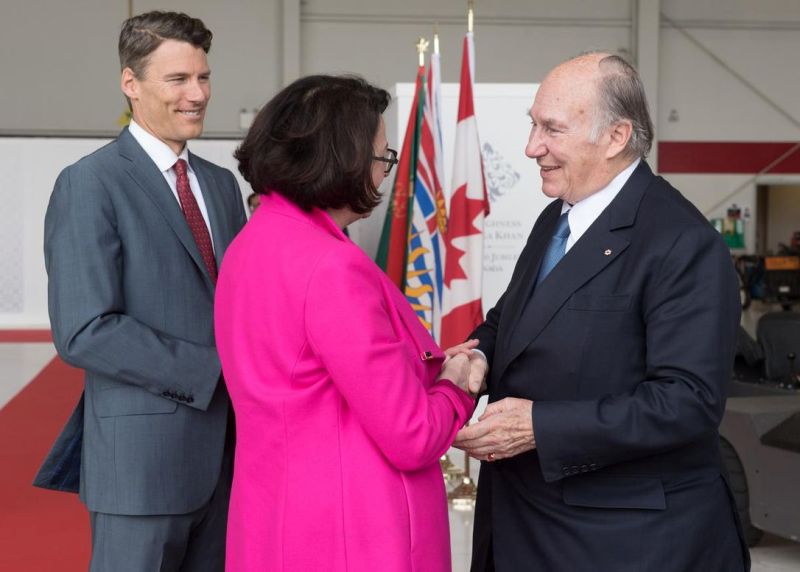
The Aga Khan was greeted upon his arrival to Vancouver by Lieutenant Governor Janet Austin and Mayor Gregor Robertson. (Submitted by AKDN)
By Cherise SeucharanStarMetro Vancouver
Sat., May 5, 2018
VANCOUVER—A small migration of Ismaili Muslims to Vancouver from across B.C. is taking place this weekend, as they gather to meet the Aga Khan on his Diamond Jubilee tour.
The Aga Khan is the worldwide religious leader, or Imam, of the Ismaili Muslims, a branch of Shia Islam. Vancouver is the latest stop on his world tour to celebrate his 60th as Imam — he was previously in Ottawa where he paid a visit to the prime minister.
Farrah Jinah, a volunteer for the festivities happening at BC Place, said the Aga Khan’s visit is a rare time when the growing Ismaili community, which is spread across the province, can come together. About 20,000 people are expected at this weekend’s events.
“I’ve been meeting people I haven’t seen for a long time,” Jinah said. “I have friends that came over from Victoria with their families, and folks from Kelowna, Nanaimo are making their way to the city.”
Participants in the Diamond Jubilee celebrations will gather in small groups to hear the Aga Khan speak, give guidance on religious and community matters, and lead prayer services.
Rahim Talib, another event volunteer, remembers when the Aga Khan last visited Vancouver a decade ago for this 50th anniversary celebrations.
“I still remember sitting here before, in the same location, and getting a chance to listen to what he shared,” Talib said. “Any time the Aga Khan comes to visit it’s really special.”
The Aga Khan is known for his dedication to community service, and leads the Aga Khan Development Network, which helps impoverished communities in Asia and Africa. In advance of the Diamond Jubilee celebration, both Talib and Jinah participated in the Ismaili Civic 150, a pledge for Ismailis across Canada to commit to one million hours of community service.
For Jinah, who volunteered over 20 hours teaching art workshops to children in Vancouver’s West End, the Ismaili ethos of community service is reflected in all Canadians.
“Giving back and caring for others and helping the vulnerable,” Jinah said, “these are strong Canadian values and what we focus in our community as well.”
Cherise Seucharan is a Vancouver-based reporter covering health and youth. Email her at [email protected].
For 20,000 Ismaili Muslims, Aga Khan visit is a time to give back
The Aga Khan visits Vancouver this weekend to celebrate his Diamond Jubilee, where he will lead prayers and spread his message of community service.

The Aga Khan was greeted upon his arrival to Vancouver by Lieutenant Governor Janet Austin and Mayor Gregor Robertson. (Submitted by AKDN)
By Cherise SeucharanStarMetro Vancouver
Sat., May 5, 2018
VANCOUVER—A small migration of Ismaili Muslims to Vancouver from across B.C. is taking place this weekend, as they gather to meet the Aga Khan on his Diamond Jubilee tour.
The Aga Khan is the worldwide religious leader, or Imam, of the Ismaili Muslims, a branch of Shia Islam. Vancouver is the latest stop on his world tour to celebrate his 60th as Imam — he was previously in Ottawa where he paid a visit to the prime minister.
Farrah Jinah, a volunteer for the festivities happening at BC Place, said the Aga Khan’s visit is a rare time when the growing Ismaili community, which is spread across the province, can come together. About 20,000 people are expected at this weekend’s events.
“I’ve been meeting people I haven’t seen for a long time,” Jinah said. “I have friends that came over from Victoria with their families, and folks from Kelowna, Nanaimo are making their way to the city.”
Participants in the Diamond Jubilee celebrations will gather in small groups to hear the Aga Khan speak, give guidance on religious and community matters, and lead prayer services.
Rahim Talib, another event volunteer, remembers when the Aga Khan last visited Vancouver a decade ago for this 50th anniversary celebrations.
“I still remember sitting here before, in the same location, and getting a chance to listen to what he shared,” Talib said. “Any time the Aga Khan comes to visit it’s really special.”
The Aga Khan is known for his dedication to community service, and leads the Aga Khan Development Network, which helps impoverished communities in Asia and Africa. In advance of the Diamond Jubilee celebration, both Talib and Jinah participated in the Ismaili Civic 150, a pledge for Ismailis across Canada to commit to one million hours of community service.
For Jinah, who volunteered over 20 hours teaching art workshops to children in Vancouver’s West End, the Ismaili ethos of community service is reflected in all Canadians.
“Giving back and caring for others and helping the vulnerable,” Jinah said, “these are strong Canadian values and what we focus in our community as well.”
Cherise Seucharan is a Vancouver-based reporter covering health and youth. Email her at [email protected].
https://www.bclocalnews.com/news/aga-kh ... op-in-b-c/
Aga Khan celebrates diamond jubilee with stop in B.C.
His Highness the Aga Khan is touring Canada to commemorate 60 years in the position
May. 5, 2018 12:00 a.m.News
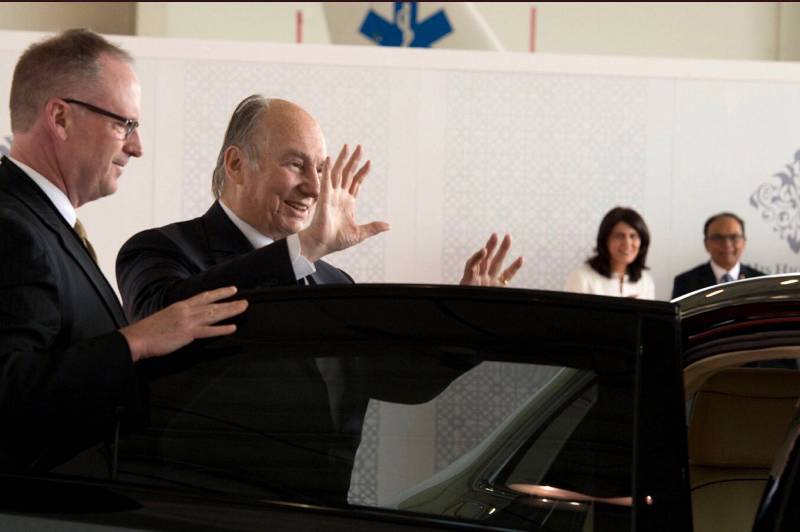
More than 12,000 Shia Ismaili Muslims and others are expected to gather at BC Place this weekend, celebrating Mawlana Hazar Imam’s diamond jubilee.
His Highness the Aga Khan is on a world-wide tour to commemorate 60 years in the position. He was in Edmonton earlier this week before arriving in Vancouver Thursday, where he was greeted by new Lieutenant Governor Janet Austin and Vancouver Mayor Gregor Robertson.
Hazar Imam also visited with Premier John Horgan where the pair spoke about the Ismaili community’s spirit of service and pluralism, as well as potential collaborations between the province and the Aga Khan Development Network, according to a statement by the Ismaili Imamat.
Mawlana Hazar Imam arrived in Vancouver on 4 May 2018 in preparation for his visits with the Western Canadian Jamats #DiamondJubilee #AgaKhan #Ismaili #OneJamat #CanadaVisit pic.twitter.com/GcSX9iULEf
— The Ismaili (@TheIsmaili) May 5, 2018
The Aga Khan is known globally for his advocacy to end global poverty and spread secular pluralism. In 2010, he was made an honorary Canadian citizen by former prime minister Stephan Harper.
Last year, the Aga Khan was part of an ethics scandal after Prime Minister Justin Trudeau and his family took a controversial vacation with him in 2016.
Thousands flock to Vancouver to see spiritual leader
At 20 years of age, the Aga Khan became Imam – or spiritual leader – of the Shia Imami Ismaili Muslims in July 1957, succeeding his grandfather, Sir Sultan Mahomed Shah Aga Khan.
He is the 49th hereditary Imam of the Shia Imami Ismaili Muslims, and spiritual leader for over 15 million people around the world who belong to the Ismaili faith, including 120,000 in Canada.
Anywhere from 12,000 to 20,000 people are expected to attend celebrations at BC Place Saturday and Sunday, including about 5,000 volunteers who have been preparing or the event for weeks.
@ashwadhwani
Aga Khan celebrates diamond jubilee with stop in B.C.
His Highness the Aga Khan is touring Canada to commemorate 60 years in the position
May. 5, 2018 12:00 a.m.News

More than 12,000 Shia Ismaili Muslims and others are expected to gather at BC Place this weekend, celebrating Mawlana Hazar Imam’s diamond jubilee.
His Highness the Aga Khan is on a world-wide tour to commemorate 60 years in the position. He was in Edmonton earlier this week before arriving in Vancouver Thursday, where he was greeted by new Lieutenant Governor Janet Austin and Vancouver Mayor Gregor Robertson.
Hazar Imam also visited with Premier John Horgan where the pair spoke about the Ismaili community’s spirit of service and pluralism, as well as potential collaborations between the province and the Aga Khan Development Network, according to a statement by the Ismaili Imamat.
Mawlana Hazar Imam arrived in Vancouver on 4 May 2018 in preparation for his visits with the Western Canadian Jamats #DiamondJubilee #AgaKhan #Ismaili #OneJamat #CanadaVisit pic.twitter.com/GcSX9iULEf
— The Ismaili (@TheIsmaili) May 5, 2018
The Aga Khan is known globally for his advocacy to end global poverty and spread secular pluralism. In 2010, he was made an honorary Canadian citizen by former prime minister Stephan Harper.
Last year, the Aga Khan was part of an ethics scandal after Prime Minister Justin Trudeau and his family took a controversial vacation with him in 2016.
Thousands flock to Vancouver to see spiritual leader
At 20 years of age, the Aga Khan became Imam – or spiritual leader – of the Shia Imami Ismaili Muslims in July 1957, succeeding his grandfather, Sir Sultan Mahomed Shah Aga Khan.
He is the 49th hereditary Imam of the Shia Imami Ismaili Muslims, and spiritual leader for over 15 million people around the world who belong to the Ismaili faith, including 120,000 in Canada.
Anywhere from 12,000 to 20,000 people are expected to attend celebrations at BC Place Saturday and Sunday, including about 5,000 volunteers who have been preparing or the event for weeks.
@ashwadhwani
